Department of Electronic and Telecommunication Engineering of the University of Moratuwa Wins First Runners-up in RISC-V Processor Design & Verification Challenge 2023
The Department of Electronic and Telecommunication Engineering of the University of Moratuwa has added another feather to its cap by winning the **first runners-up** place in the RISC-V Processor Design & Verification Challenge held in Bangalore, India on September 18th and 19th, 2023¹.
The competition was organized by DVCon India and was aimed at promoting innovation and creativity in processor design and verification. The teams were required to design and verify a RISC-V processor that could meet the performance and power requirements of modern computing systems. The winning team from the Department of Electronic and Telecommunication Engineering, comprising Janindu Leelananda and Thishakya Bandara, demonstrated their technical prowess by developing a processor that could deliver high performance while consuming minimal power.
The University of Moratuwa has always been at the forefront of innovation and research in electronics, telecommunications, and allied disciplines in engineering. The success of the teams from the Department of Electronic and Telecommunication Engineering is a testament to the quality of education and research offered by the university².
Congratulations to Janindu Leelananda, Thishakya Bandara, and the entire team from the Department of Electronic and Telecommunication Engineering for their outstanding performance in the competition!
For more information about the contest, please visit [DVCon India’s website](https://dvcon-india.org/invite-for-global-design-contest/).
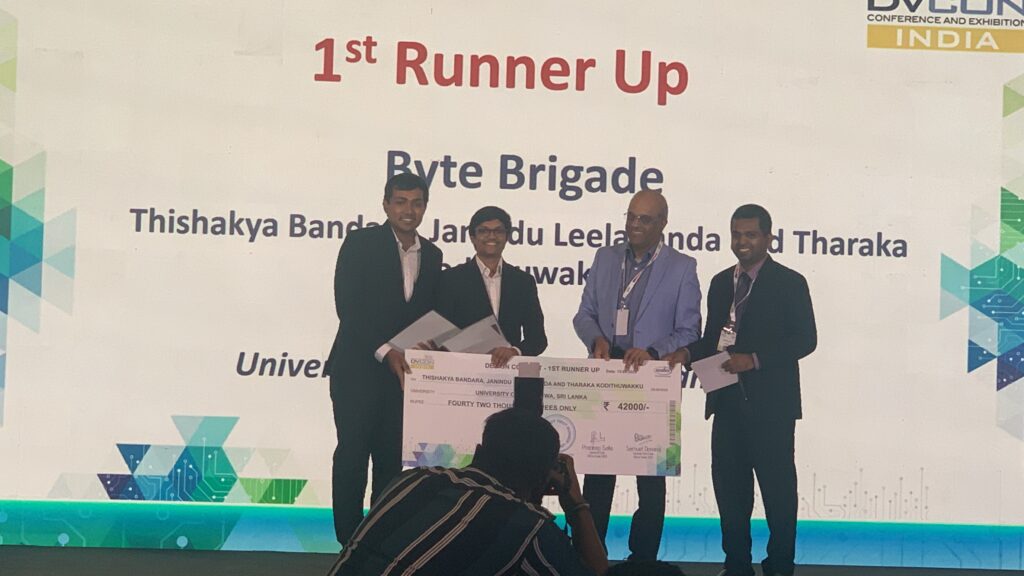
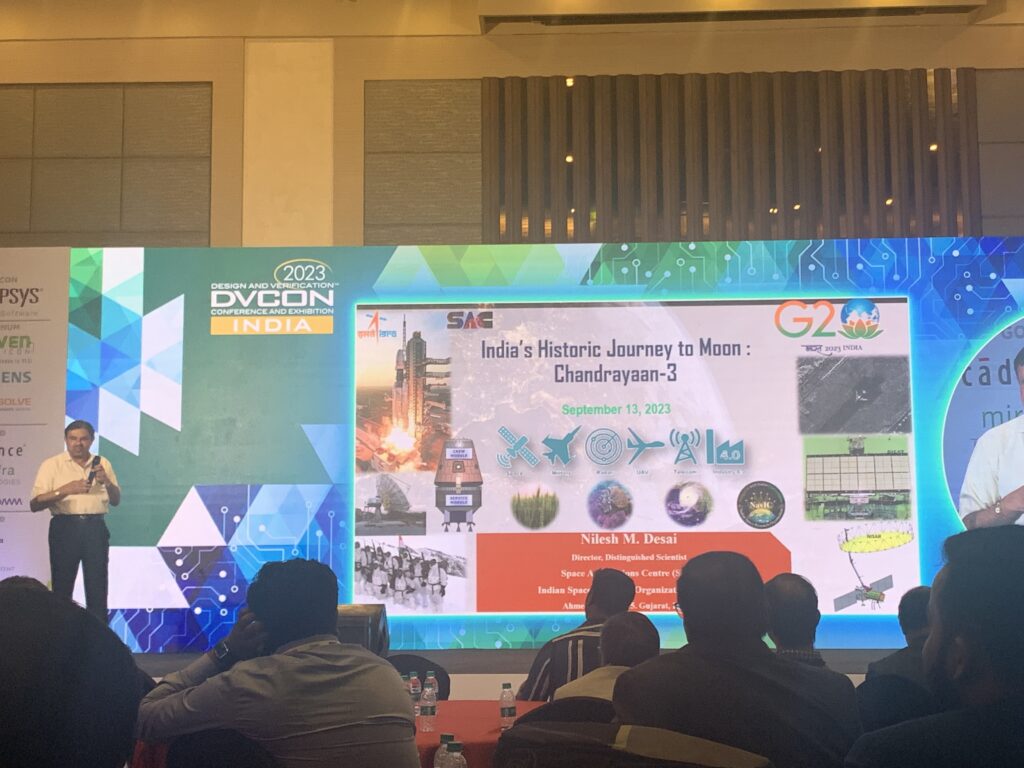
Department of Electronic and Telecommunication Engineering Wins Top Places in SLIIT’s RoboFest 2023
The Department of Electronic and Telecommunication Engineering of the University of Moratuwa has won laurels in the recently concluded robot competition organized by Sri Lanka Institute of Information Technology (SLIIT). The teams representing the department secured first and second place in the competition held on 24th and 25th September 2023.
The competition was a platform for students to showcase their technical skills and creativity in designing and building robots that could perform various tasks. The teams from the Department of Electronic and Telecommunication Engineering demonstrated their expertise in robotics by developing robots that could navigate through obstacles, pick up objects, and perform other complex tasks with ease.
The University of Moratuwa has always been at the forefront of innovation and research in electronics, telecommunications, and allied disciplines in engineering. The success of the teams from the Department of Electronic and Telecommunication Engineering is a testament to the quality of education and research offered by the university.
Congratulations to the winning teams from the Department of Electronic and Telecommunication Engineering for their outstanding performance in the competition!
: https://www.sliit.lk/annual-events/robofest/ : https://ent.uom.lk/
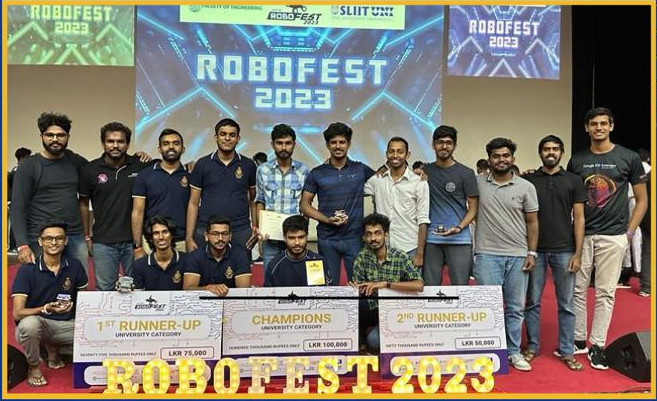
Spark Challenge Crowns Champions After Electrifying Grand Finale!
The Department of Electronic and Telecommunication Engineering at the University of Moratuwa buzzed excitedly on June 7th, 2023, as the Spark Challenge 2022/23 held its much-anticipated pitching Session. Teams brimming with innovative ideas battled it out, leaving the judges with a tough decision.
Five teams were chosen to advance to the Grand Finale following the session, marking the culmination of nearly a year of brainstorming and development. At the finale, which was held on the 11th of June 2023 at the Civil Auditorium, the top five competitors presented their final pitches. After an exciting final round, the winners were invited onto the stage. Team Spectro, who proposed a solution to the energy crisis where biological processes of green algae could be used to produce hydrogen power, emerged as the second runner-up of the challenge. Then the first runner-up award went to the team Techstatic, who implemented a product which had the capability of warning the farmers about the fertilizing requirements after analyzing the soil condition. Then, finally, the winner was the Team Pathfinders, who came up with a solution for picking up the right balance of chemical composition for different crops.

A true engineer must engage in professional-level projects that address real problems the world faces. The SPARK challenge will reward individuals and groups that create unique, innovative, socially, and environmentally responsible solutions to bring about significant positive transformative impact on society, industry and the wider environment. We had many students getting engaged with electronic-telecom projects over a period of one year under this challenge.
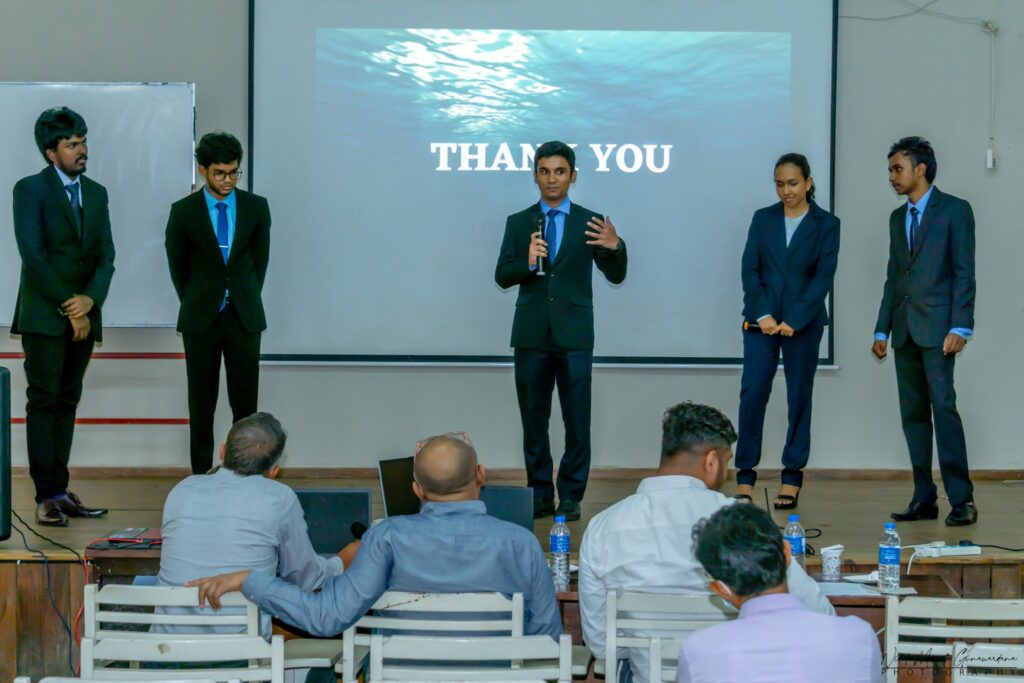
Congratulations to all the participants who poured their hearts into the competition! The Spark Challenge continues to be a breeding ground for Sri Lanka’s brightest minds, fostering solutions for a sustainable future. SPARK challenge will continue with another episode in 2024.
Read MoreENTC Career Fair
The Department of Electronic and Telecommunication Engineering (ENTC) at the University of Moratuwa hosted a successful career fair for its graduating class on March 7, 2023. The event attracted numerous organizations that specialize in electronics, electronic design automation, telecommunication, machine learning, data science, and software development, among other related fields.
The ENTC department is renowned for its exceptional academic programs, which enable students to reach their fullest potential. This is achieved through the contributions of high-caliber academic staff, talented students, carefully designed curricula, state-of-the-art technologies and research, and a well-received student experience. The department offers two highly sought-after specializations, B.Sc. Honors in Electronic and Telecommunication Engineering and B.Sc. Honors in Biomedical Engineering.
The ENTC curricula are carefully designed, current, and industry-relevant, and provide students with the skills to reach the frontiers of technology. The department has identified the thematic areas of communications, reconfigurable and embedded systems, robotics and automation, computer vision and pattern recognition, and biomedical technologies as areas of advancement. The forward-looking and diverse academic staff, with higher degrees from well-known universities around the world, facilitate this endeavor.
To foster research, the department offers M.Sc., M.Phil., and Ph.D. degrees. The taught M.Sc. programs in Telecommunication and Electronics and Automation attract students from industry. These education programs prepare students for challenging careers in industry and academia in Sri Lanka and elsewhere.
The graduates of the department are exceptionally talented. Only the top performers out of the 250,000 students who sit for the country-wide advanced level examination are admitted to the B.Sc. Eng. Hons degrees at the University of Moratuwa. Out of this already selected group, a student must excel in the semester 1 examination to be able to follow the programs at ENTC, which admits only 116 students. This places the department’s graduates within the top 0.01% of their age cohort.
Students at ENTC experience a technologically advanced, supportive, and friendly environment. Laboratories equipped with modern instruments and industry-standard software make students ready for professional work. The five-storied building houses these laboratories and provides space for studying, engaging in projects, and recreation. Students organize exhibitions, industry forums, and talent shows inculcating harmony and leadership. The students foster a sense of social responsibility, manifested through activities such as the E-care community service program, one of many activities of the E-Club, the student organization of the department. Students greatly benefit from this fruitful life experience the ENTC family offers.
The rich academic culture, talented students, research, facilities, supportive environment, and qualified faculty enable the Department of Electronic and Telecommunication Engineering to produce multi-faceted graduates who excel in industry and research. With such a comprehensive and inclusive approach, the department continues to provide students with the necessary skills to succeed in their chosen fields.
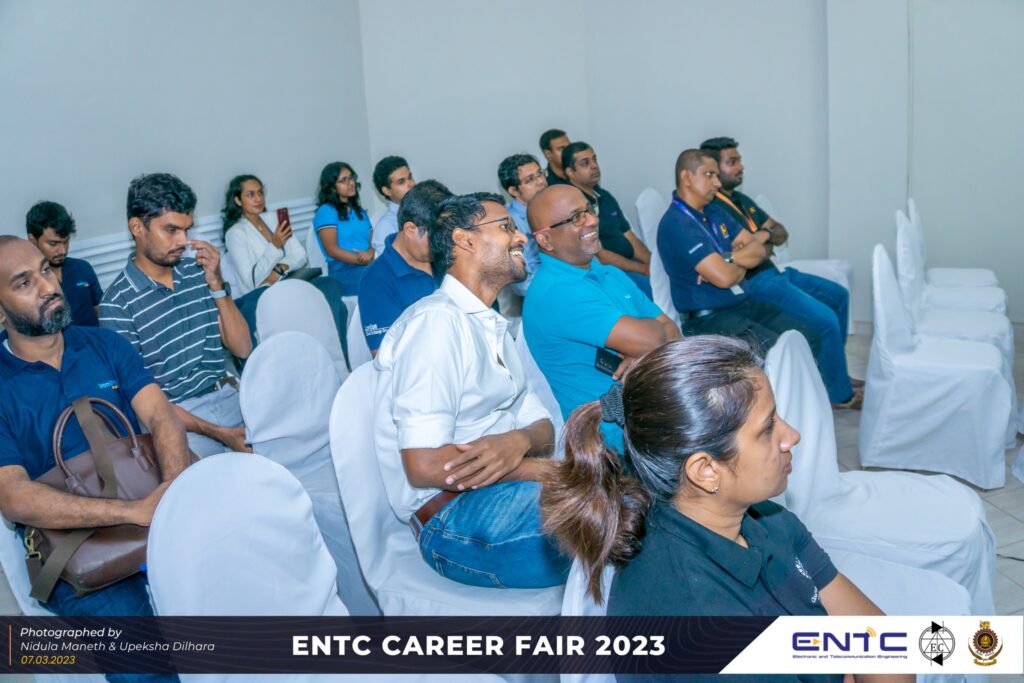
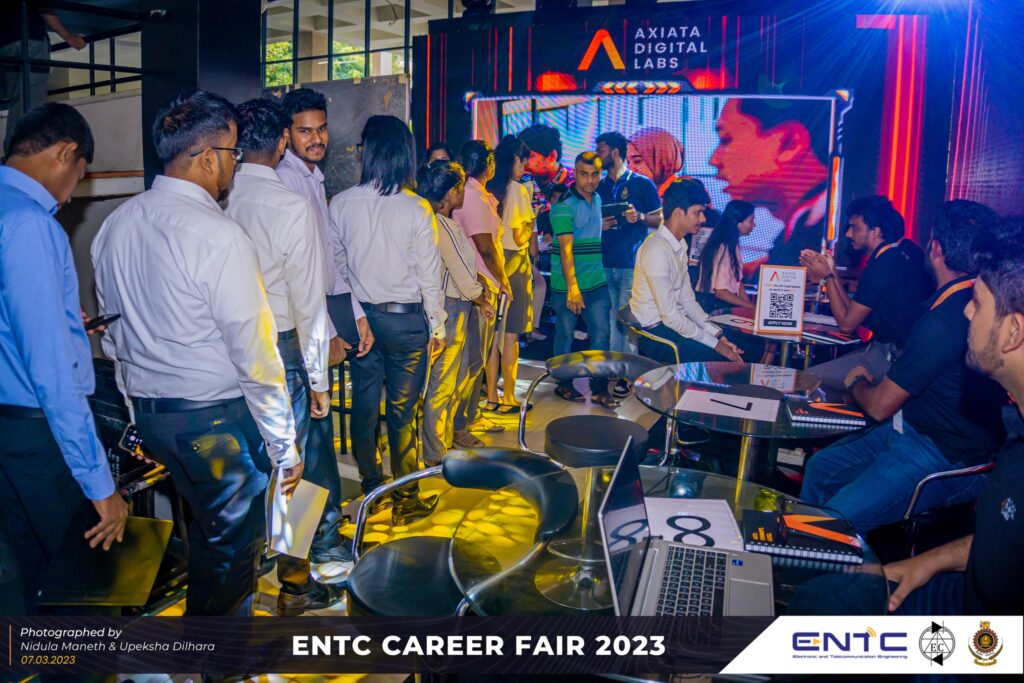
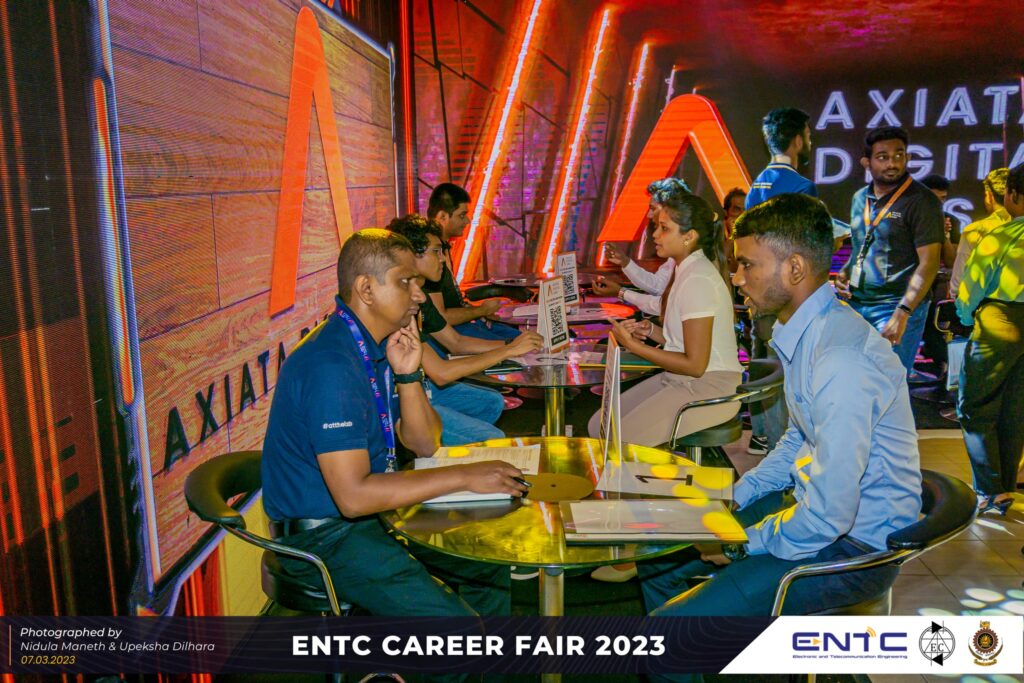
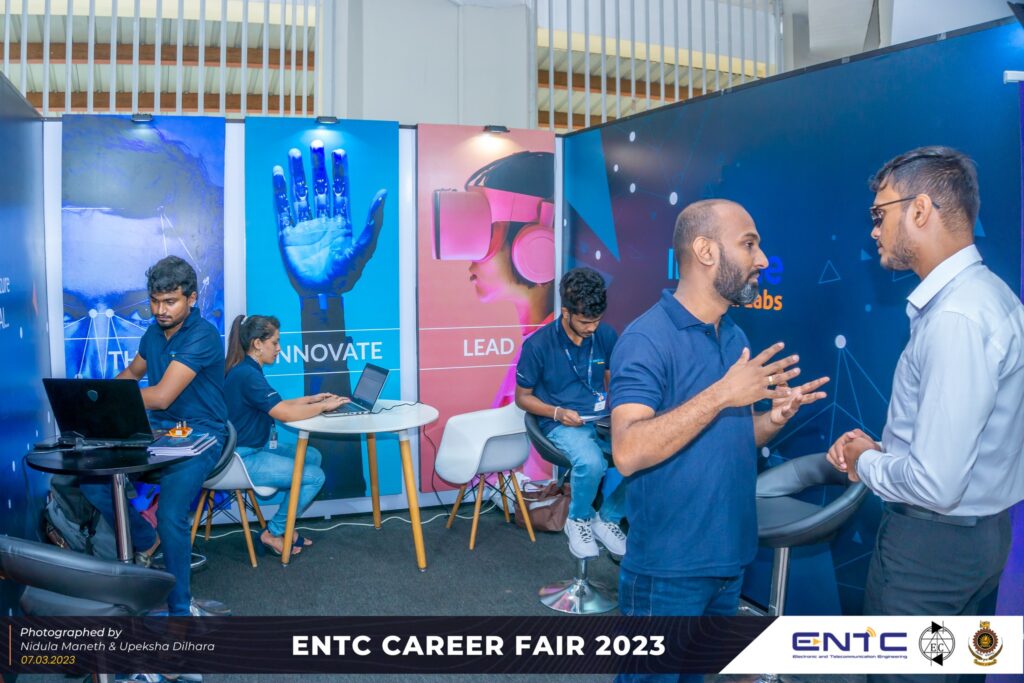
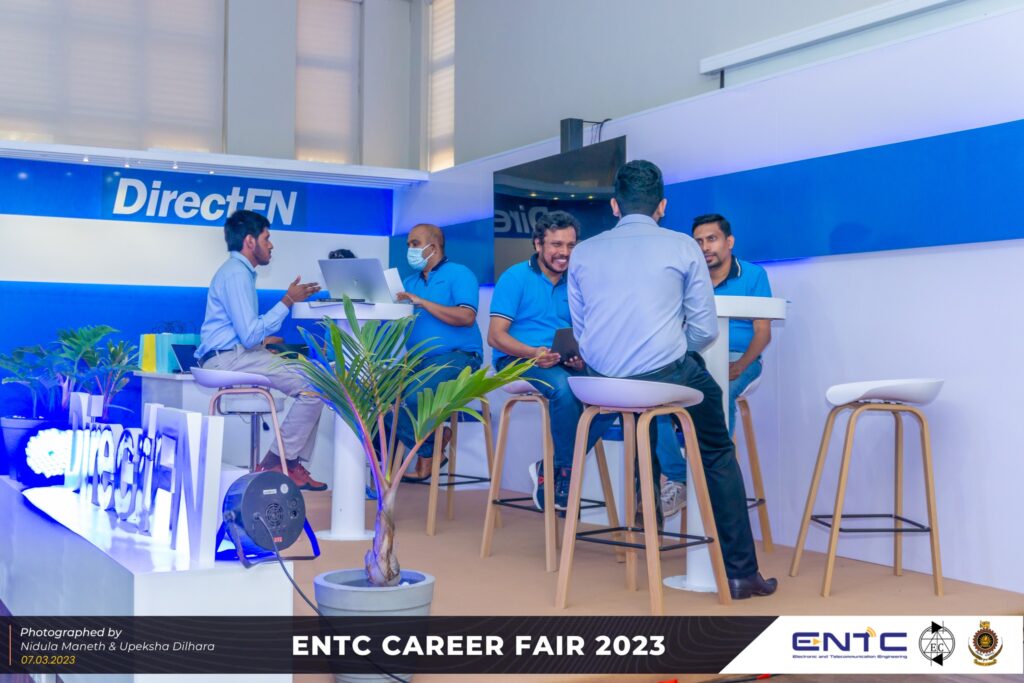
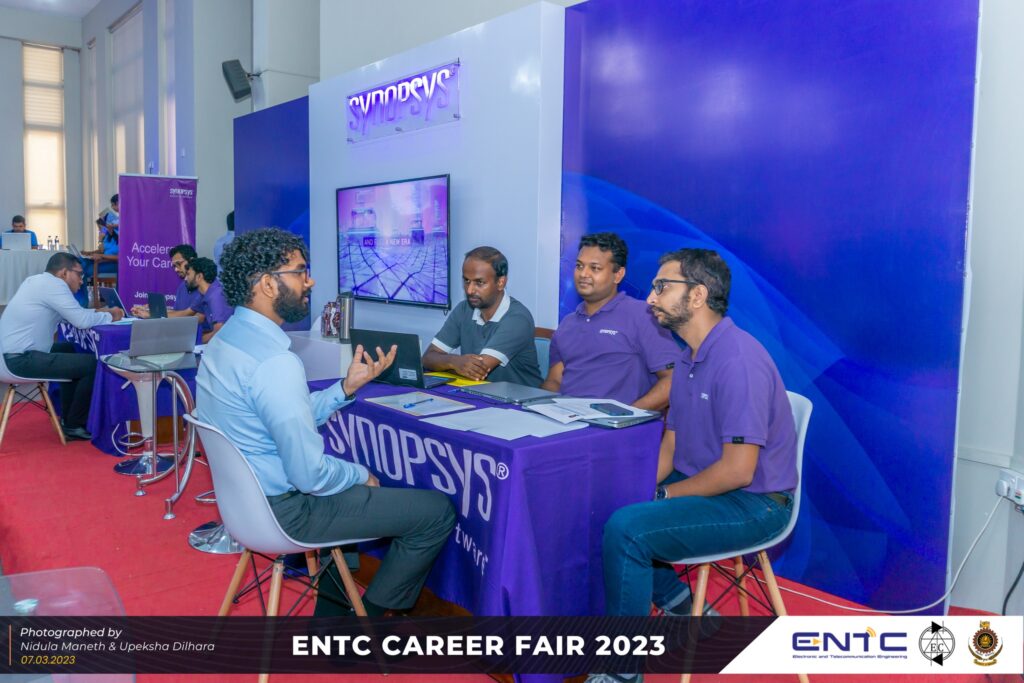
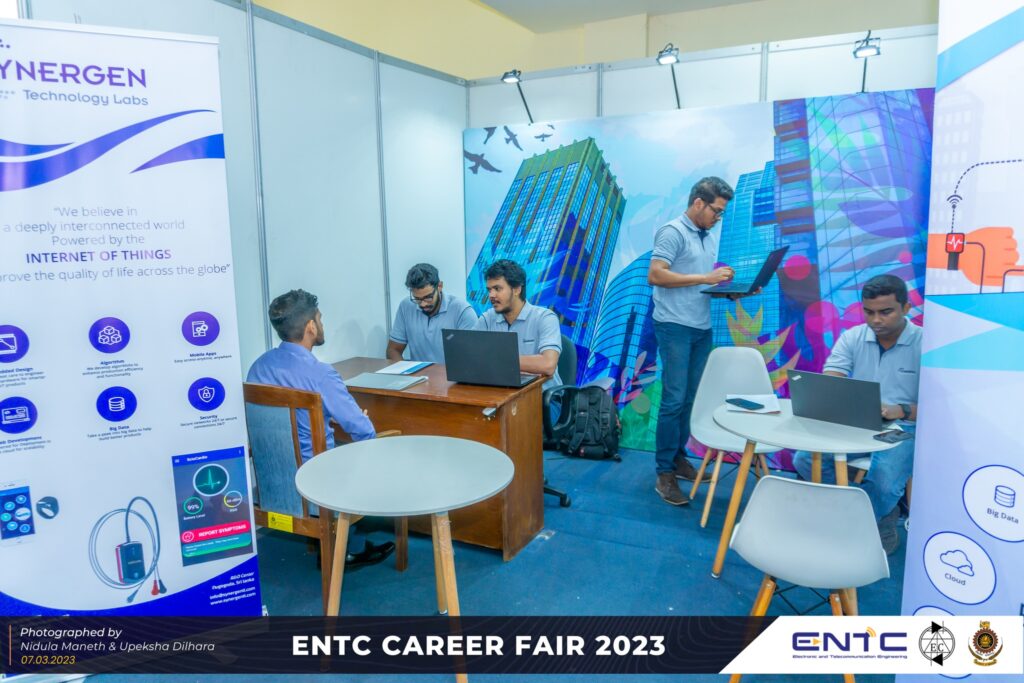
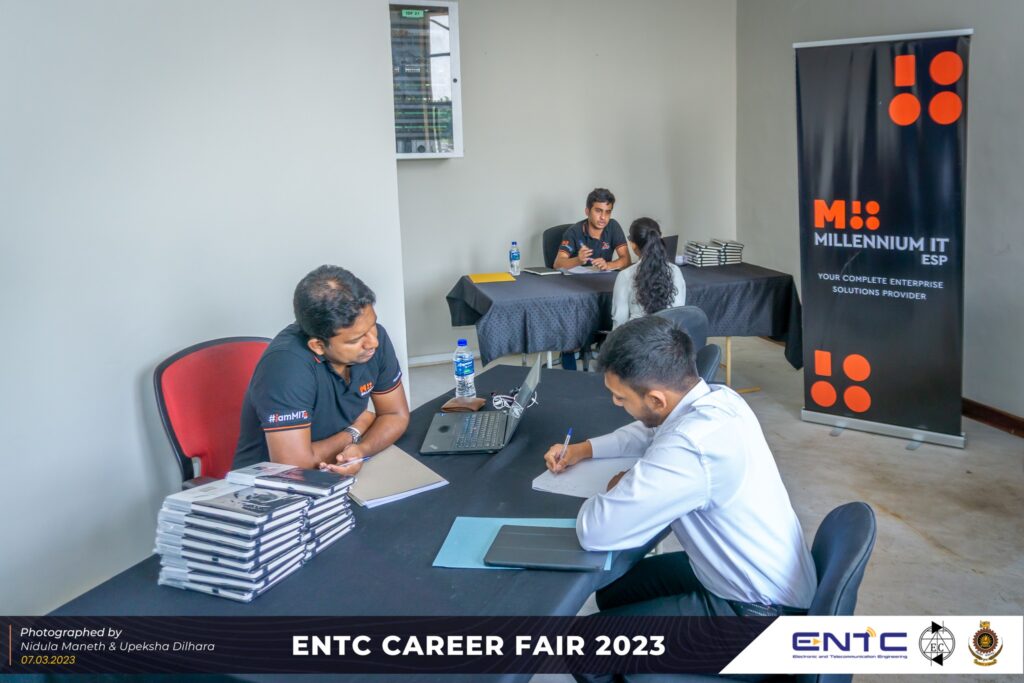
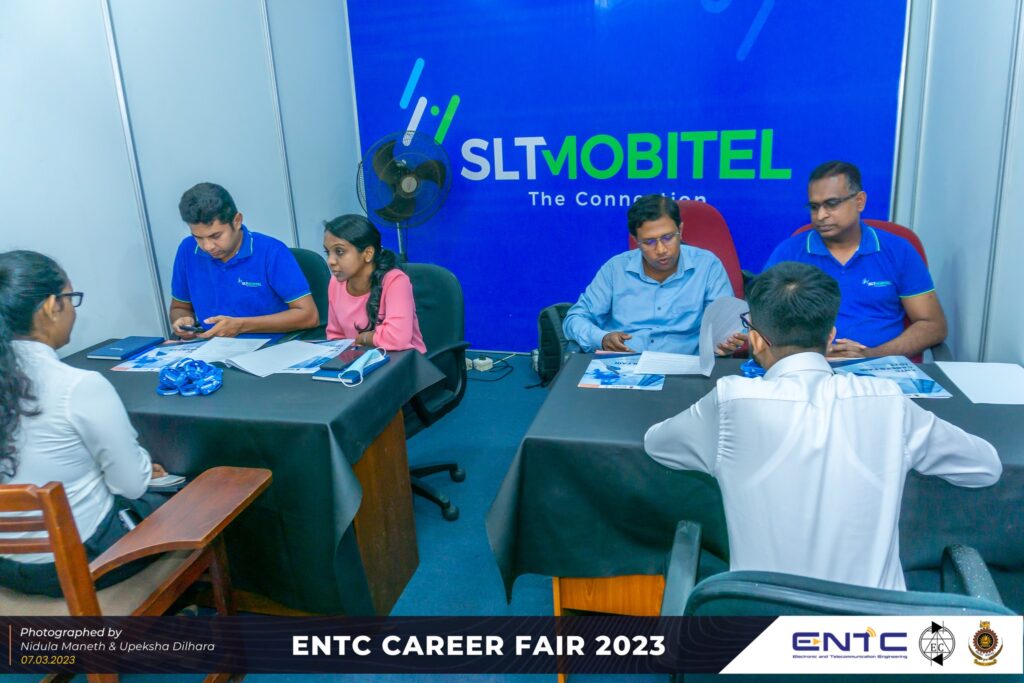
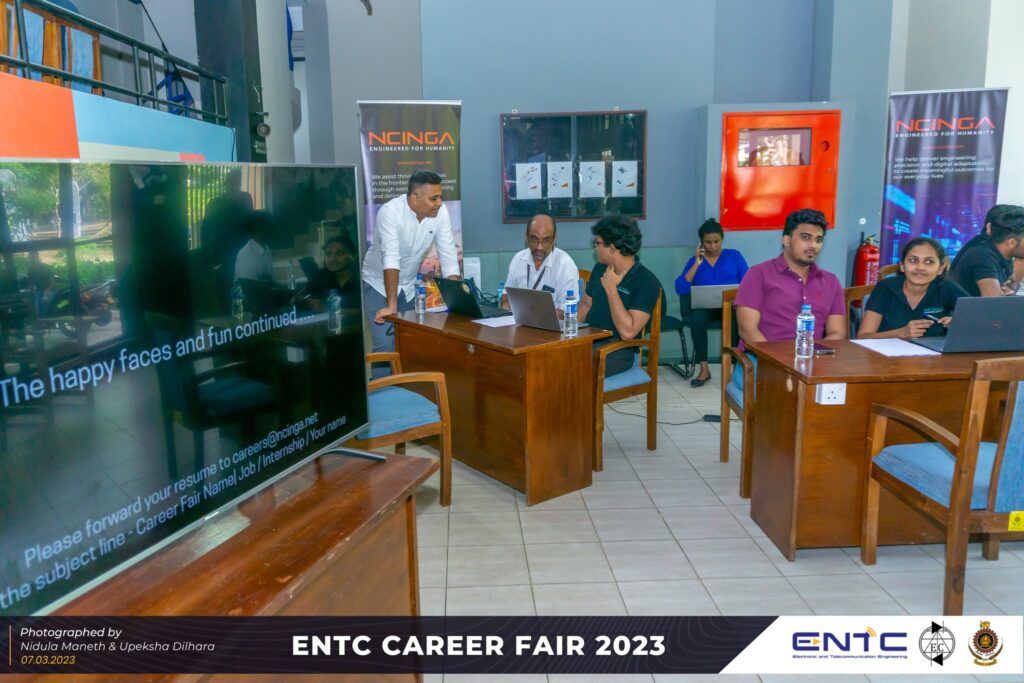
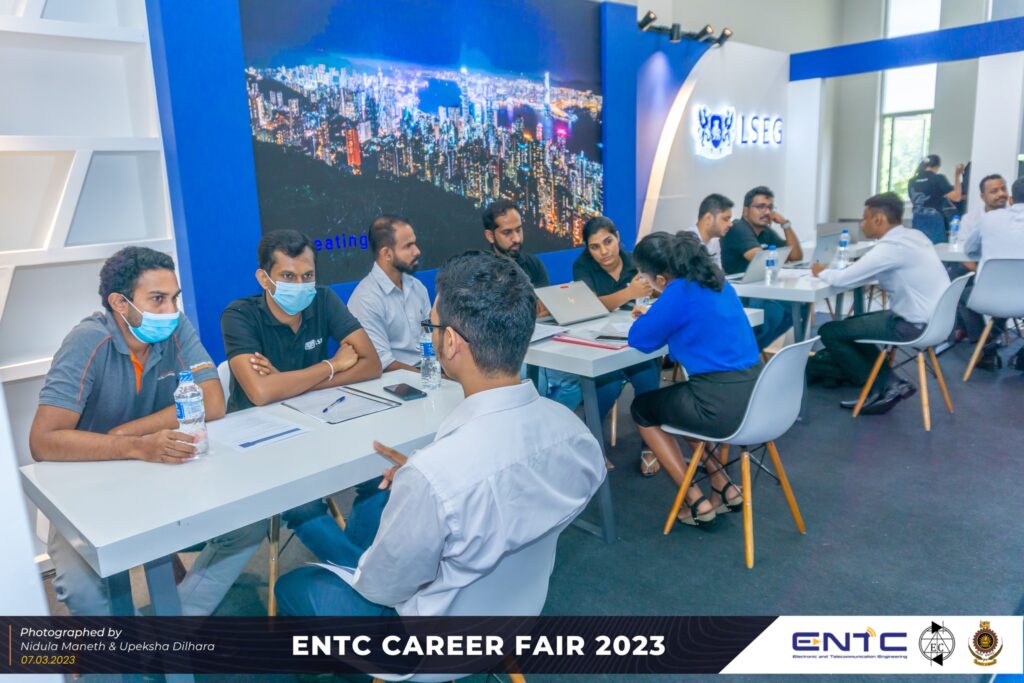
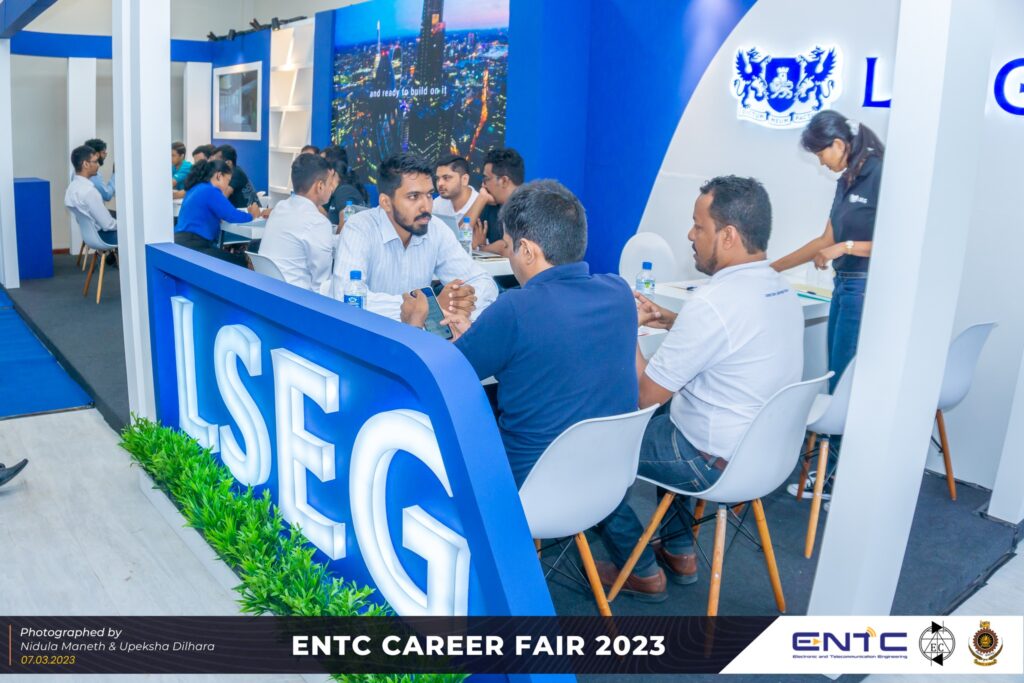
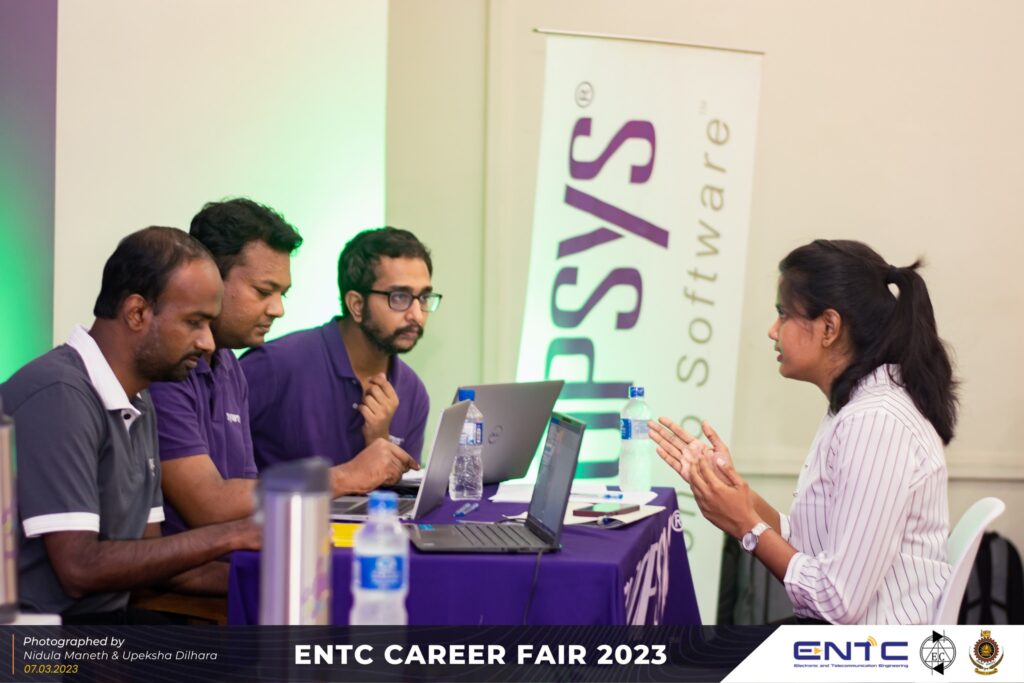
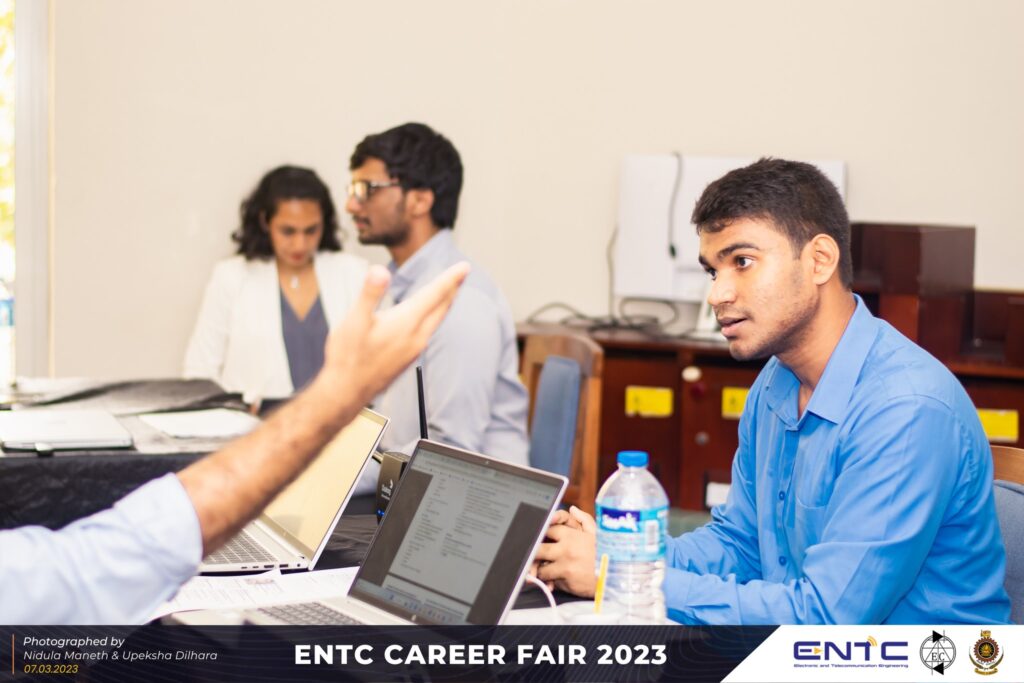
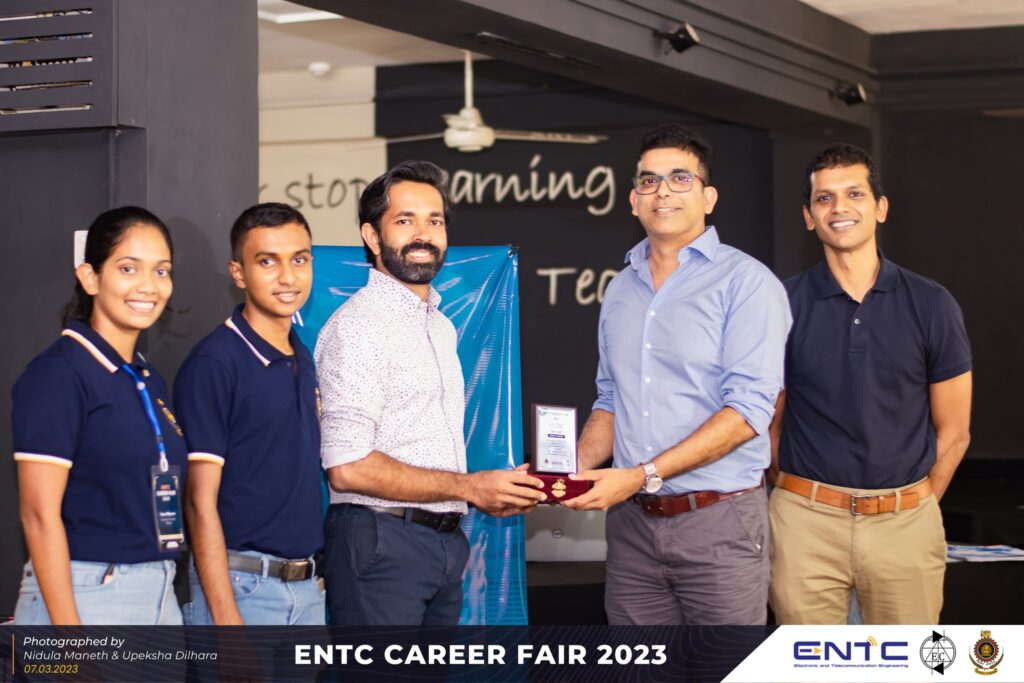
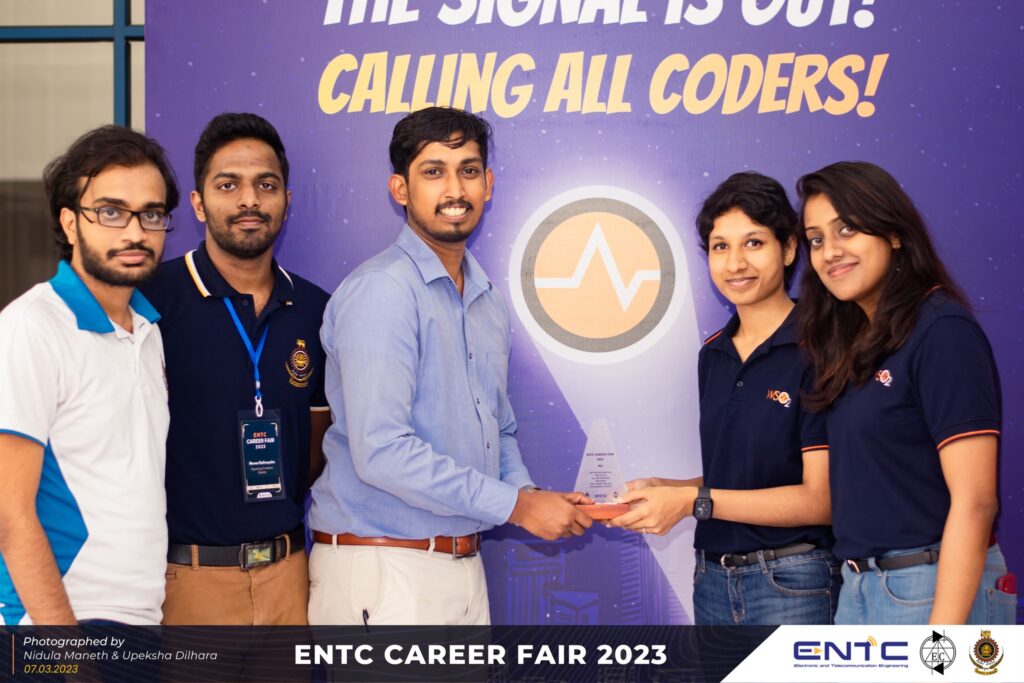
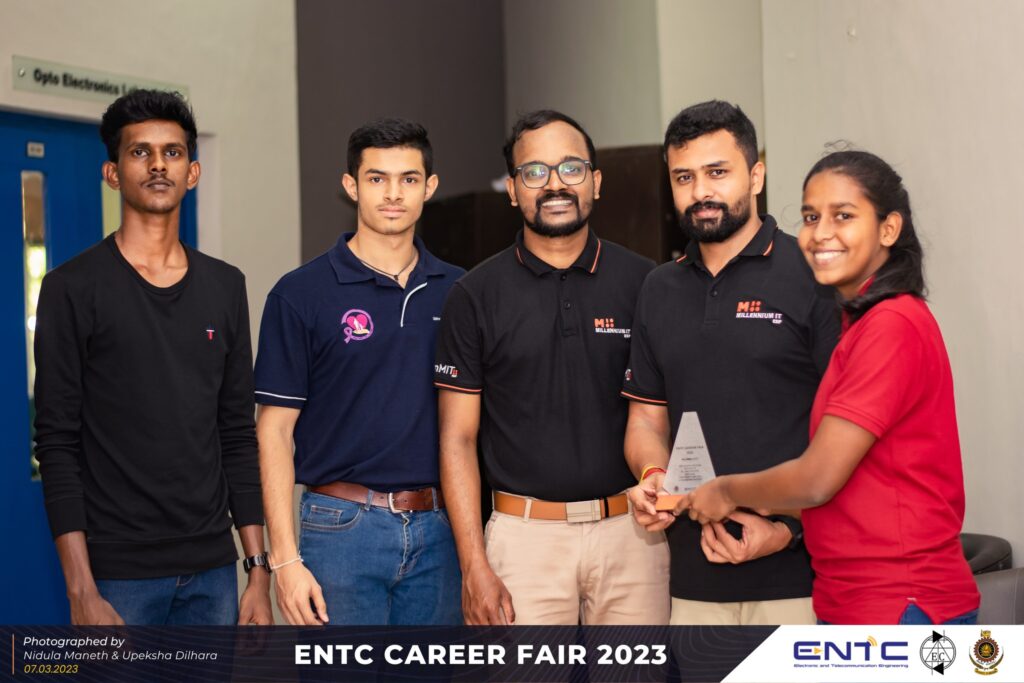
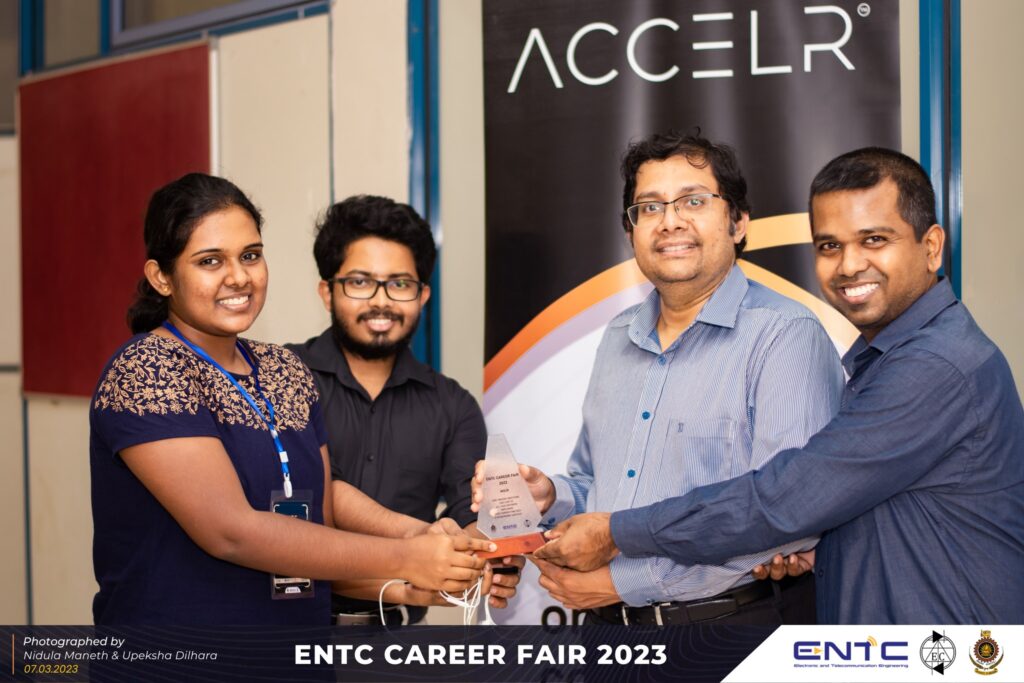

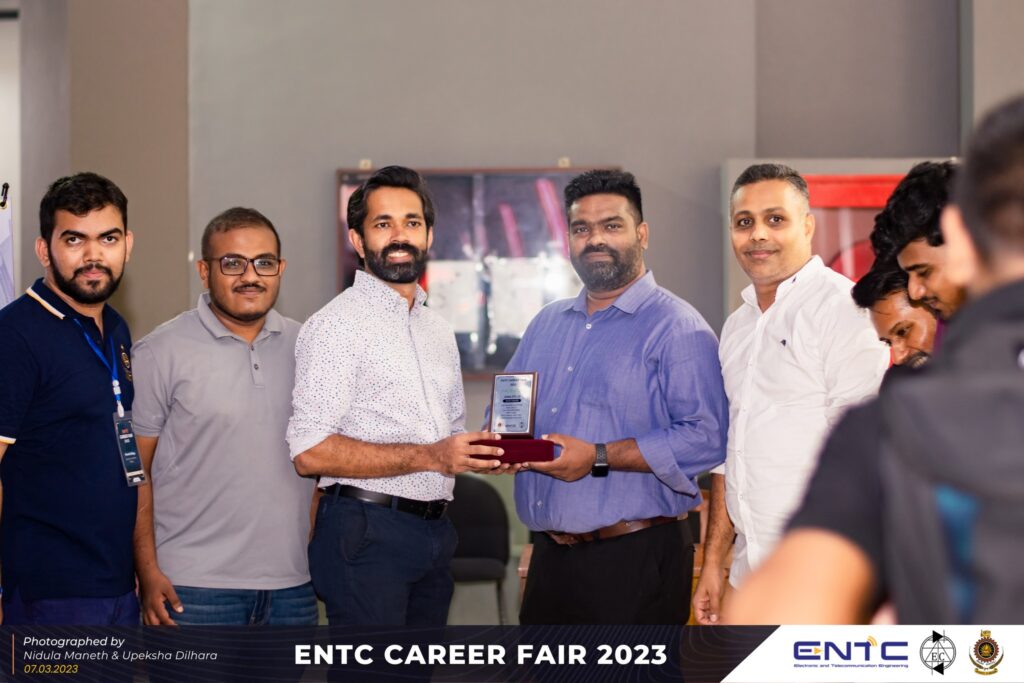
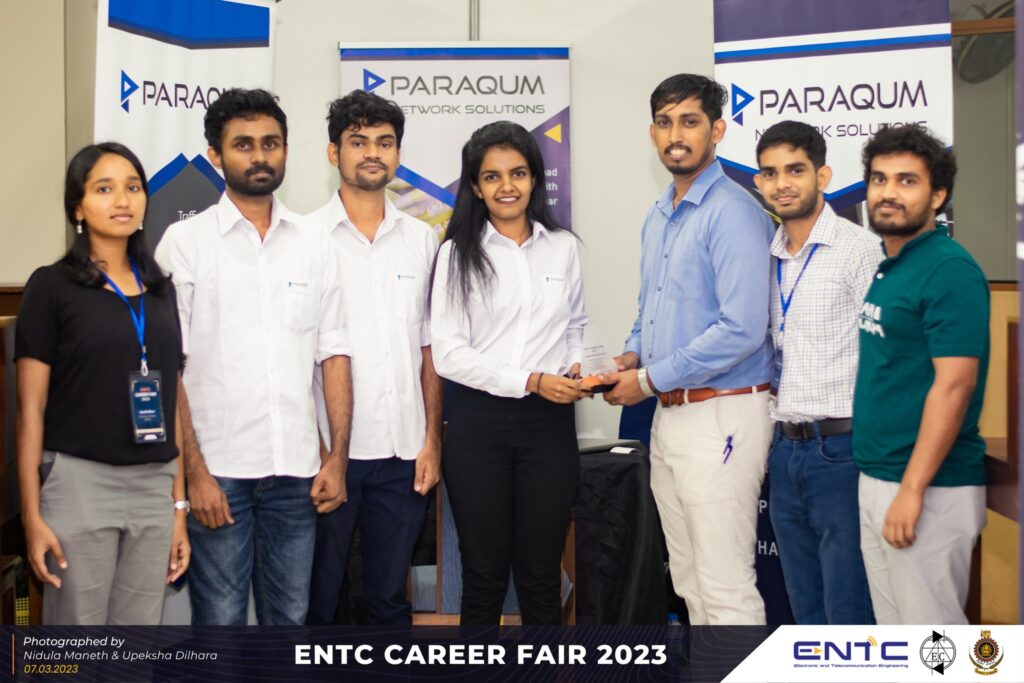
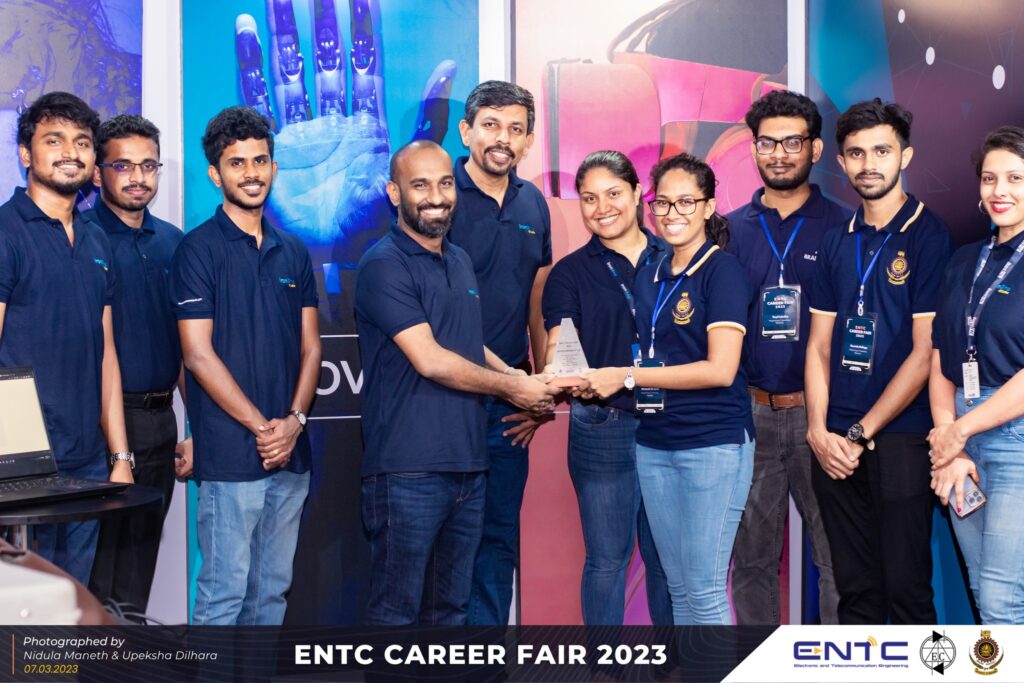
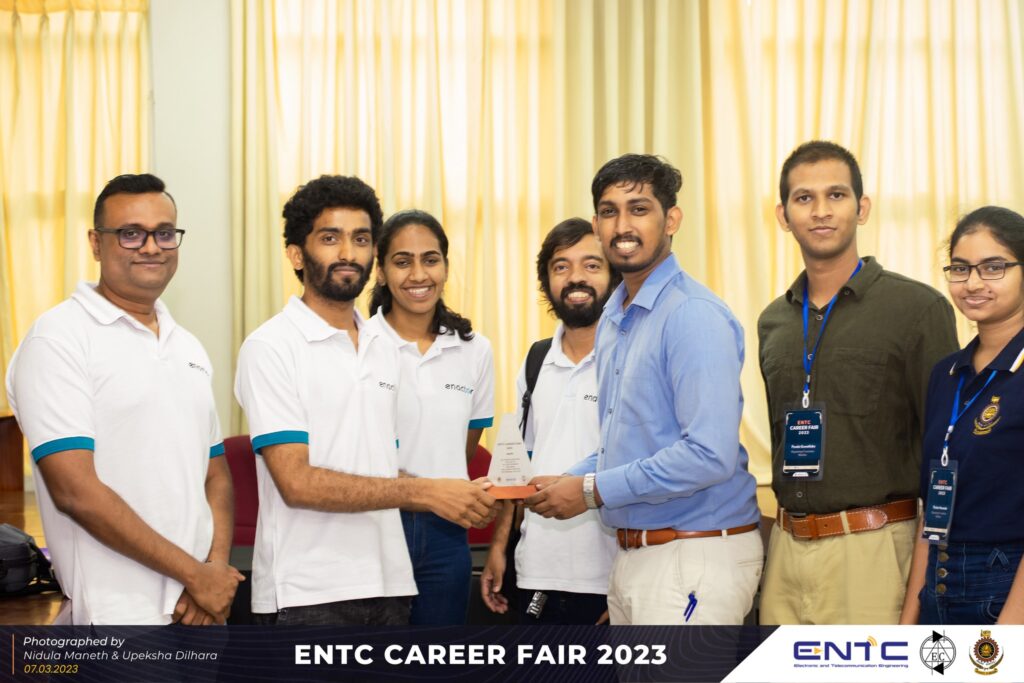
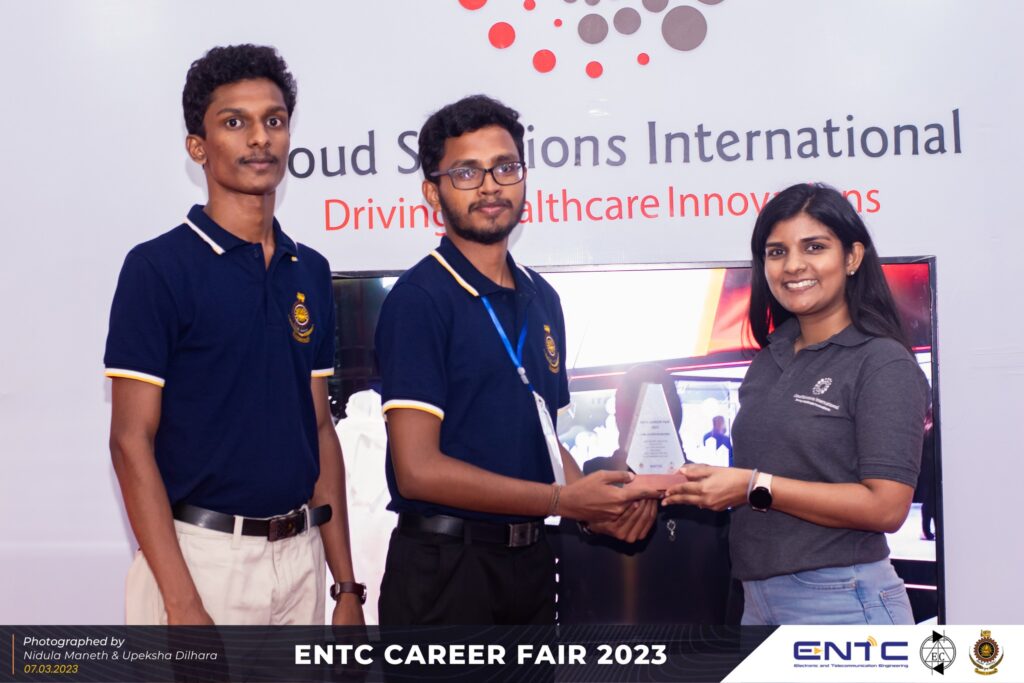
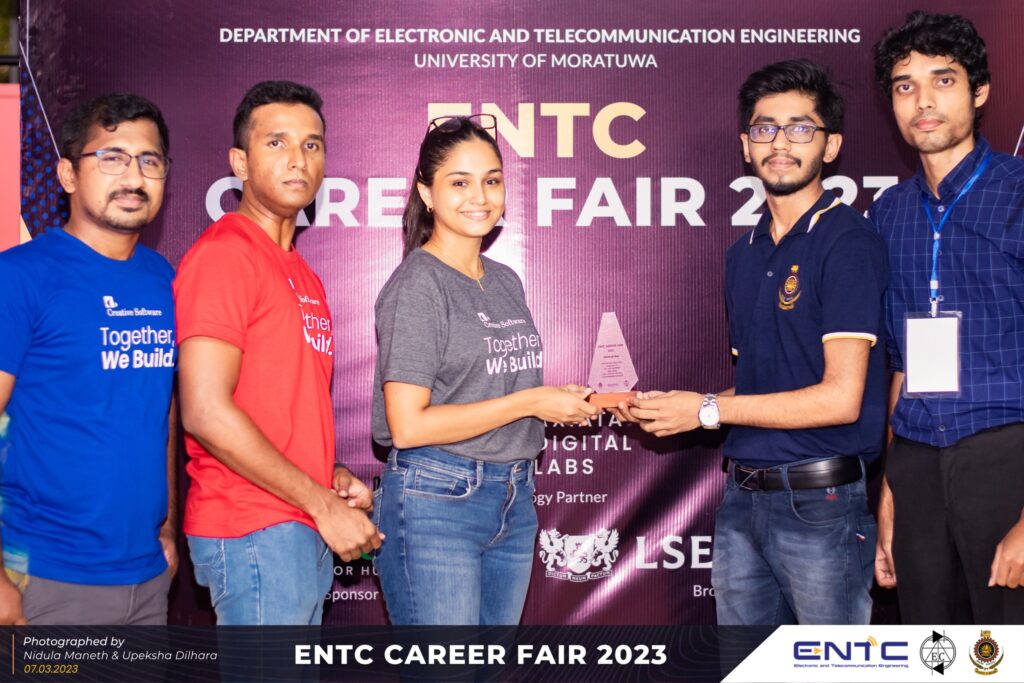
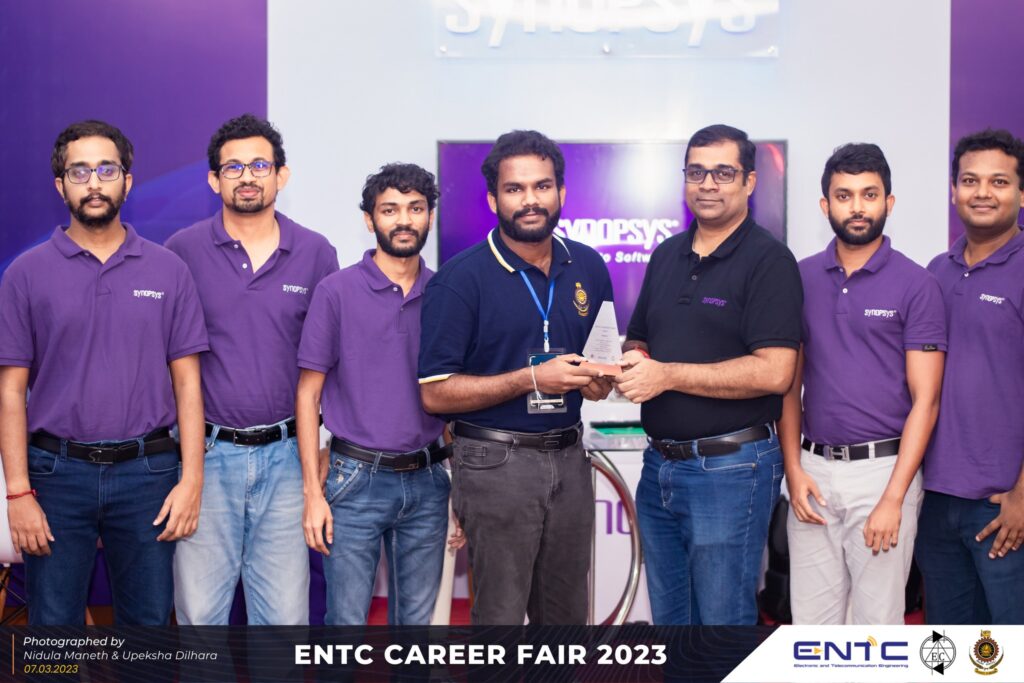
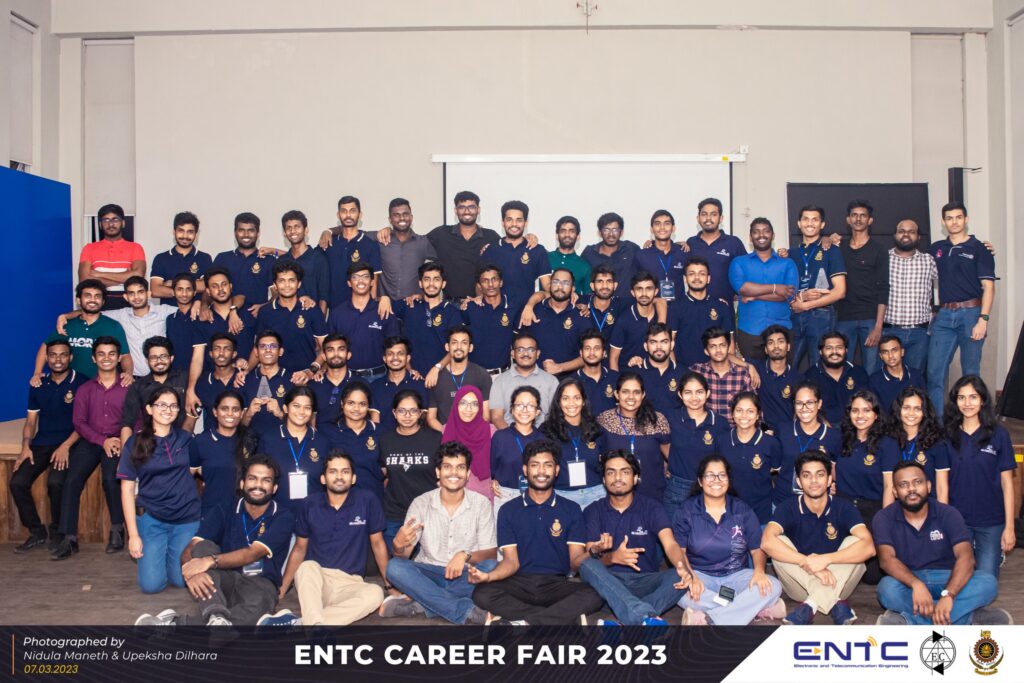
ENTC Open Day
The Department of Electronic and Telecommunication Engineering at the University of Moratuwa held an Open Day on January 17, 2023, to showcase the department’s facilities, projects, and laboratories to the new intake of students. The event was organized by the Electronic Club and saw a large number of students in attendance.
The Open Day began with a series of brief talks by the faculty members of the department, who provided an overview of the programs and opportunities available. The students were then given the opportunity to explore the department’s facilities and interact with faculty members and senior students.
The final year, third year, and second-year students actively participated in the event, organizing, demonstrating, and explaining various aspects of the department’s projects and facilities to the prospective students.
The Open Day showcased many projects, including final-year projects in computer vision, metaverse, augmented reality, unmanned aerial vehicles (UAVs), machine learning, software-defined radio, mobile robotics, electronics, and processor design. In addition, the second-semester projects were also demonstrated.
The prospective students were taken on a tour of the department’s various laboratories, including the biomedical engineering laboratory, analog electronics laboratory, digital electronics laboratory, telecommunication laboratory, computer vision laboratory, unmanned aerial vehicles laboratory, and K. K. Y. W. Perera Mobile Communications laboratory, among many other facilities.
The Open Day was well-received by the students, who appreciated the opportunity to experience the department’s facilities and projects first-hand. Many of the prospective students expressed their interest in pursuing a career in electronic and telecommunication engineering, noting the exciting and diverse range of projects and opportunities available within the field.
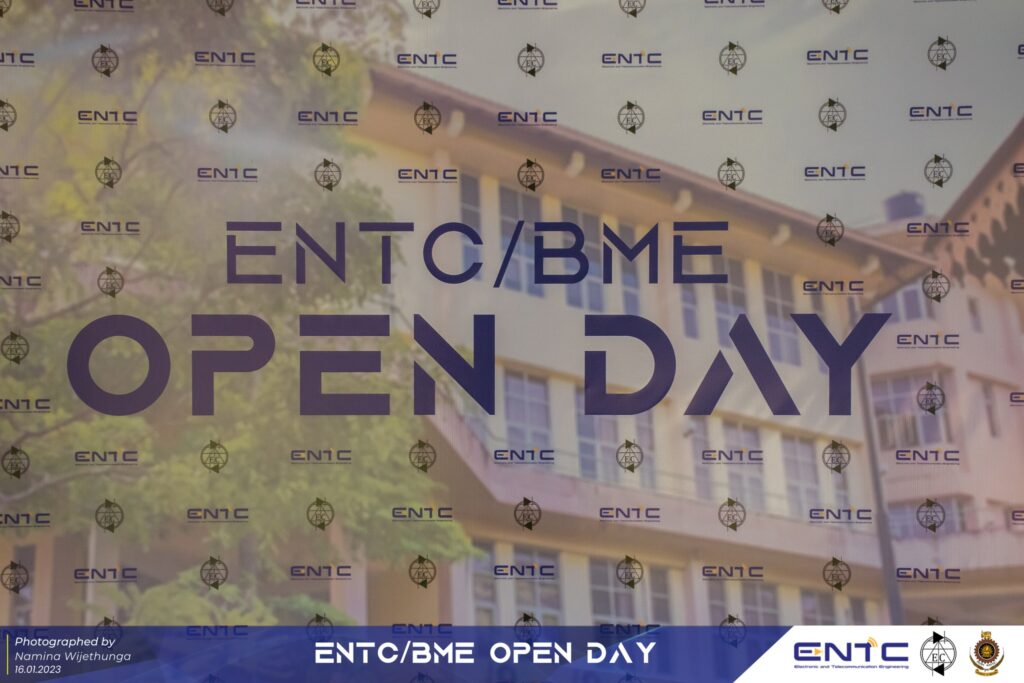
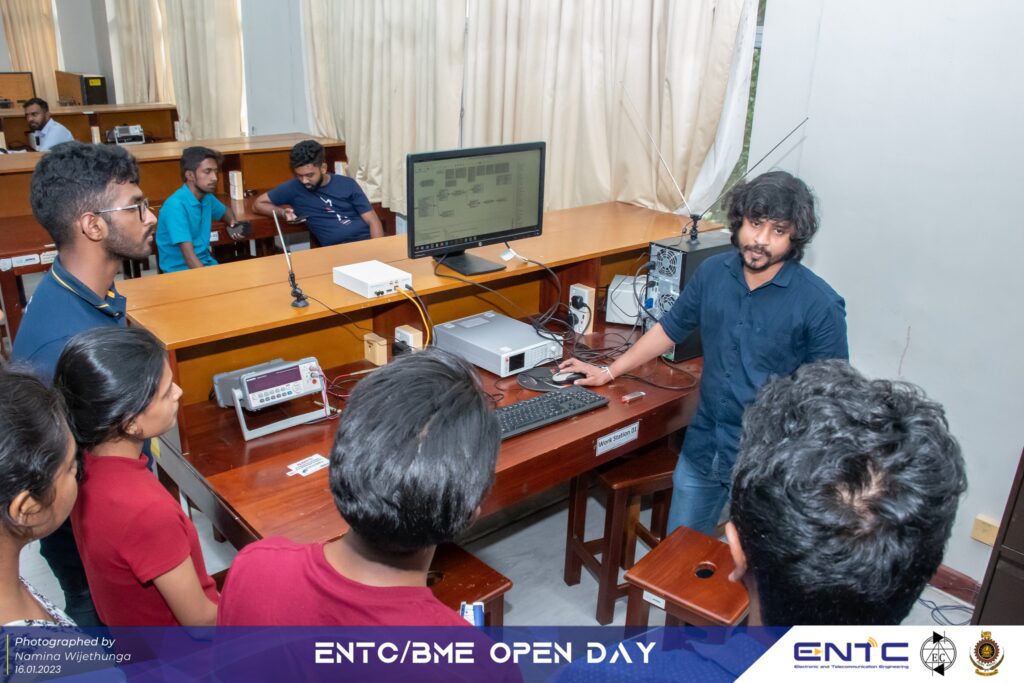
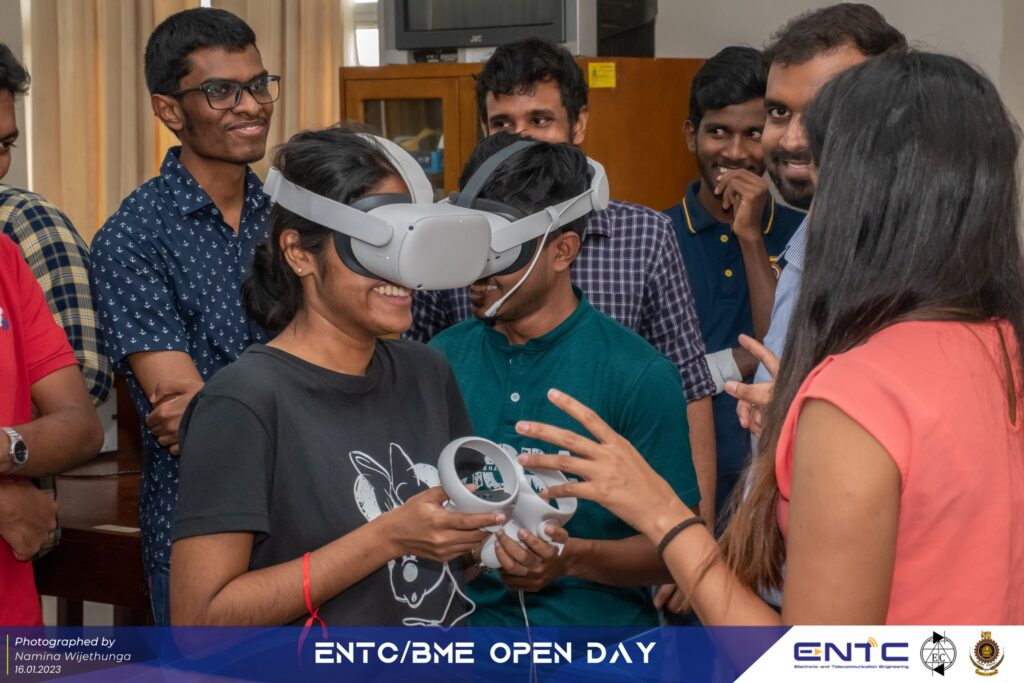
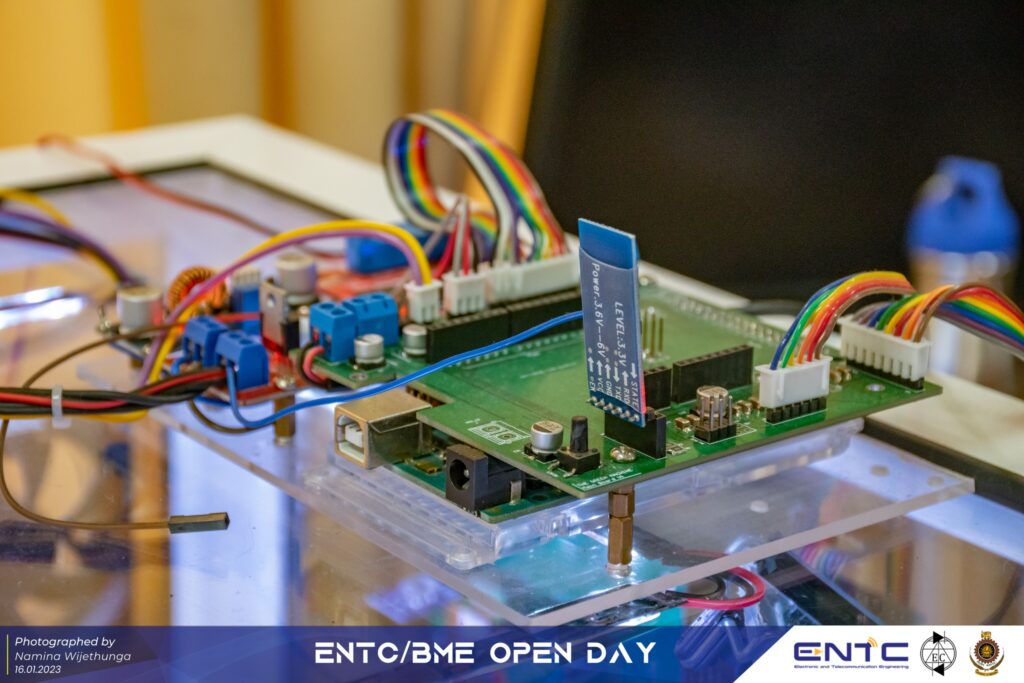
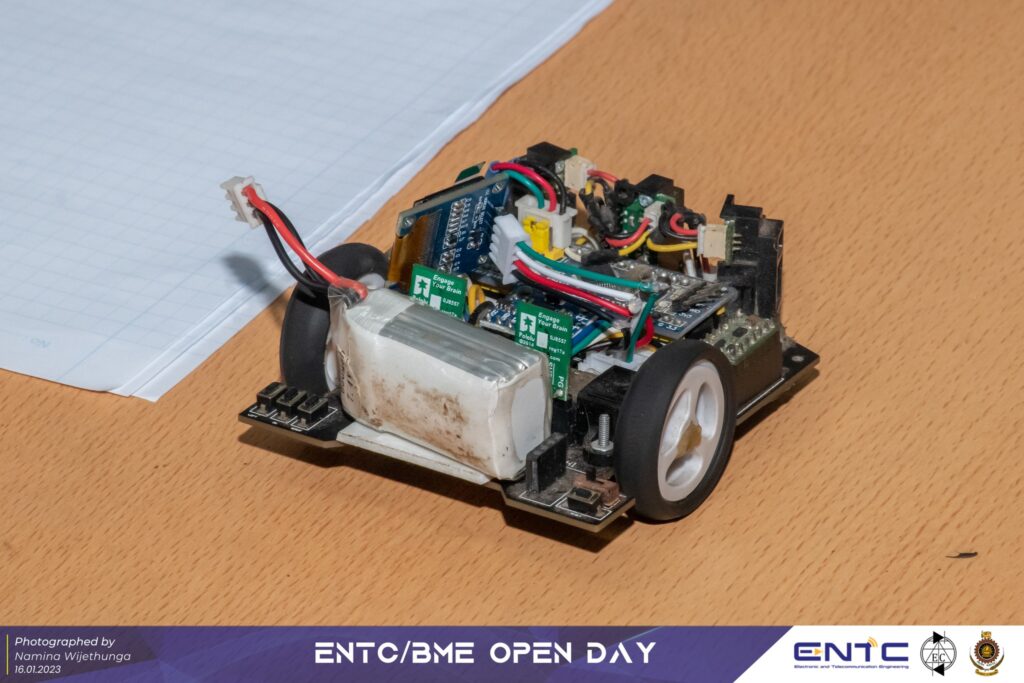
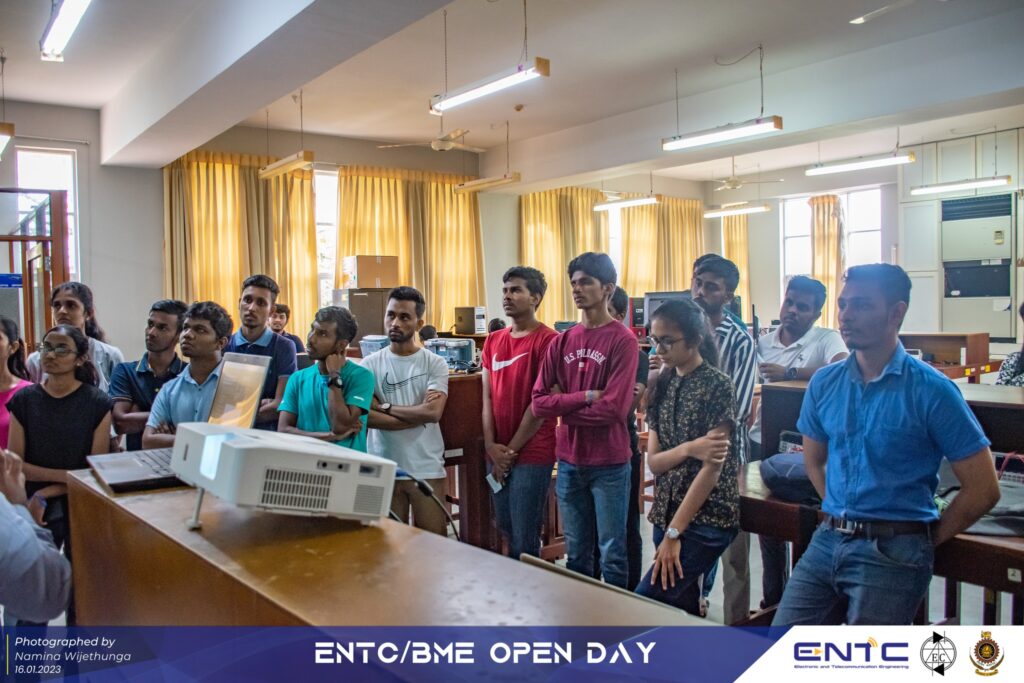
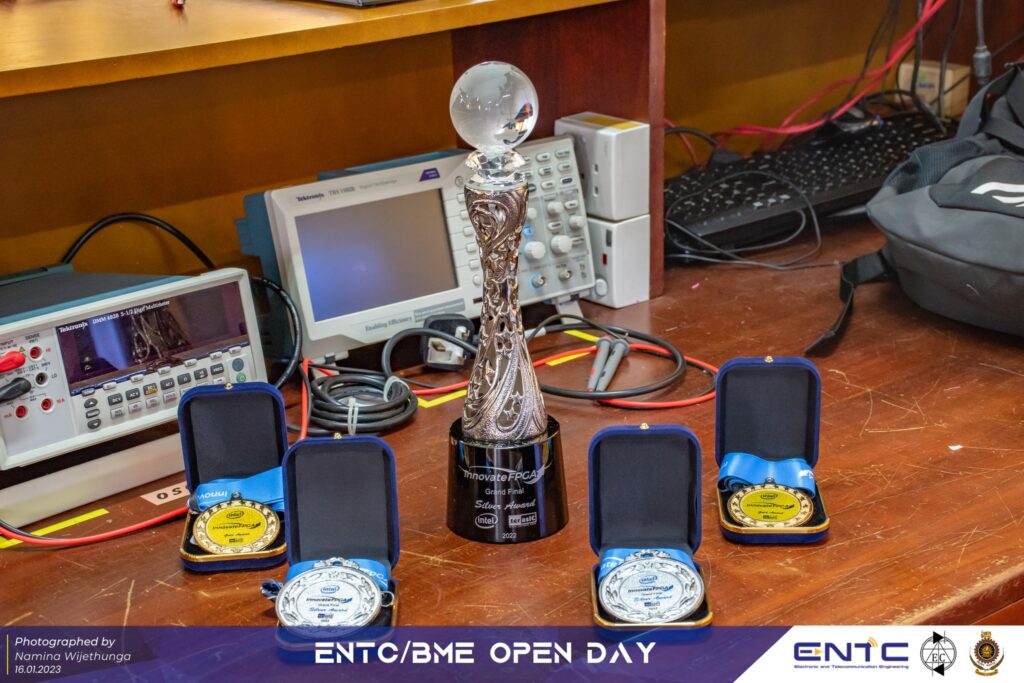
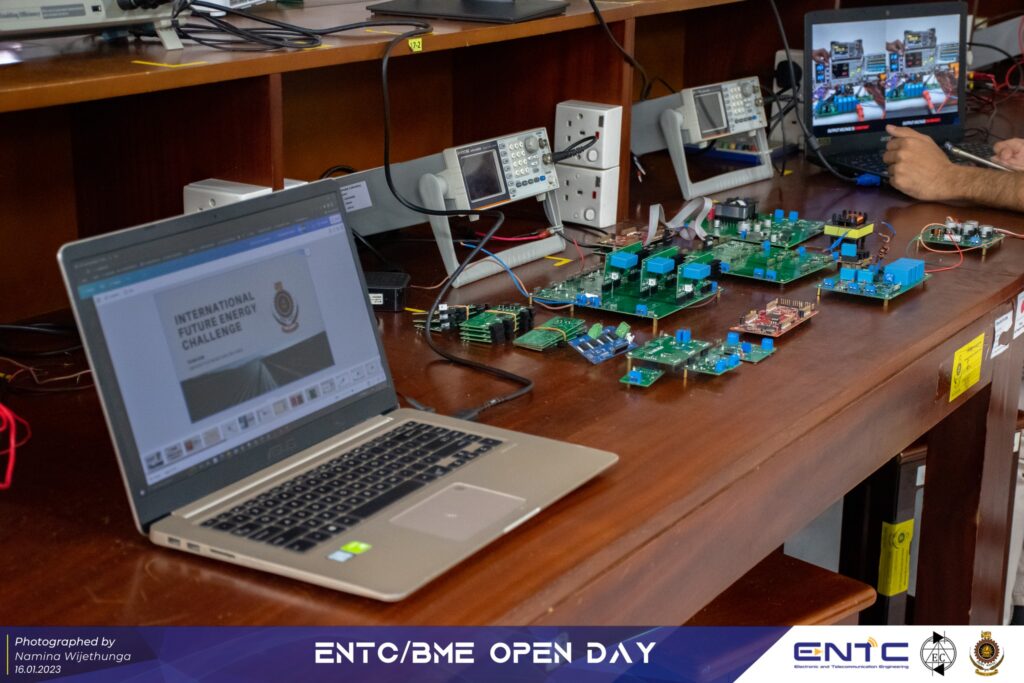
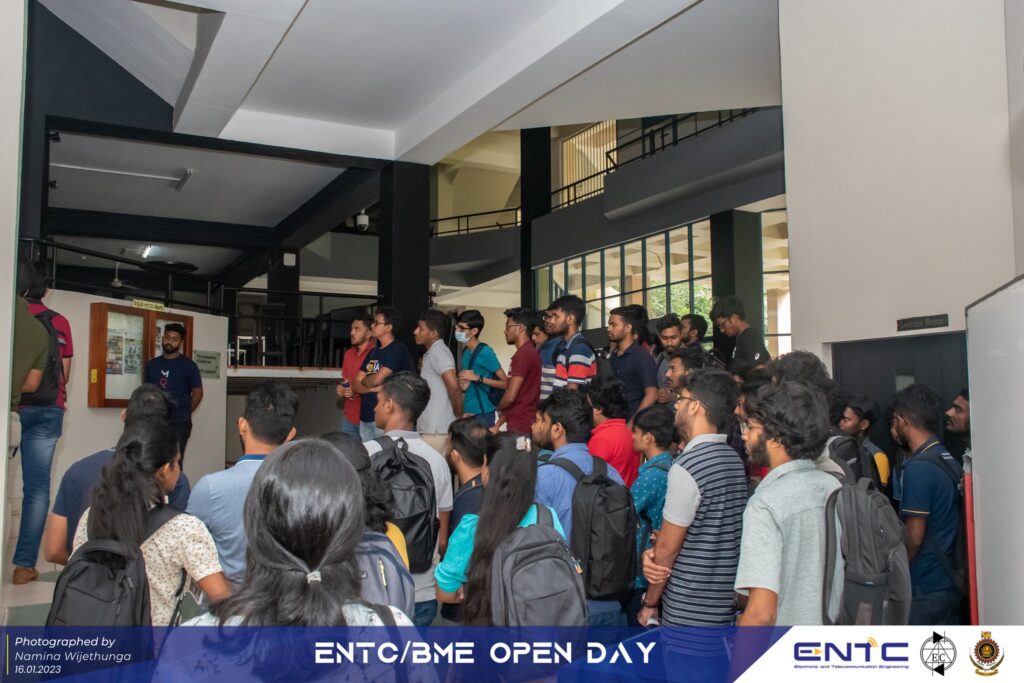
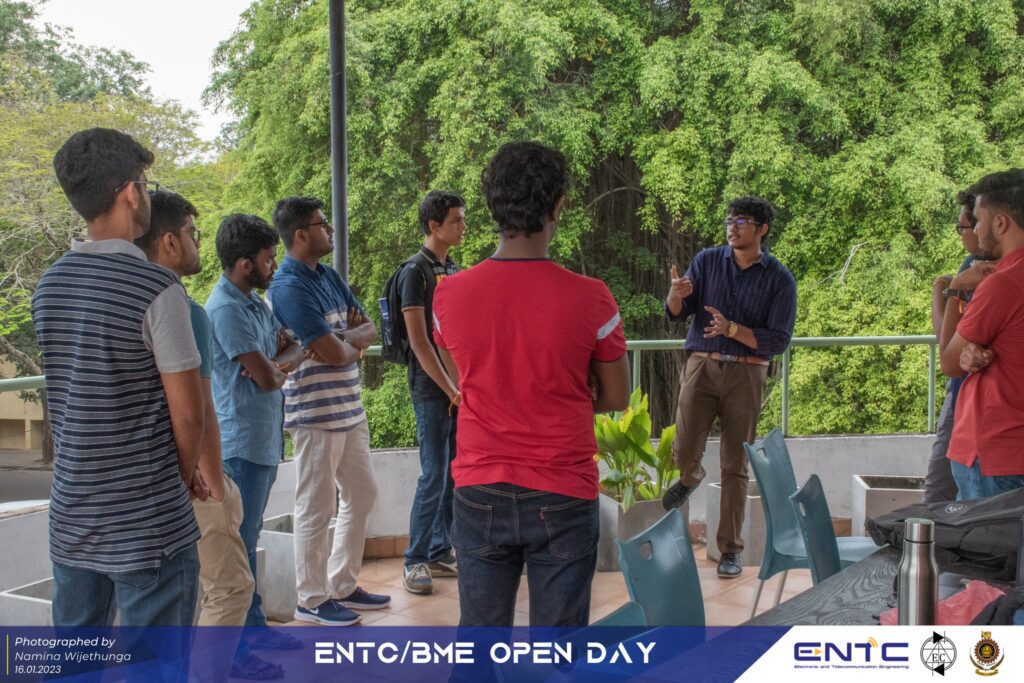
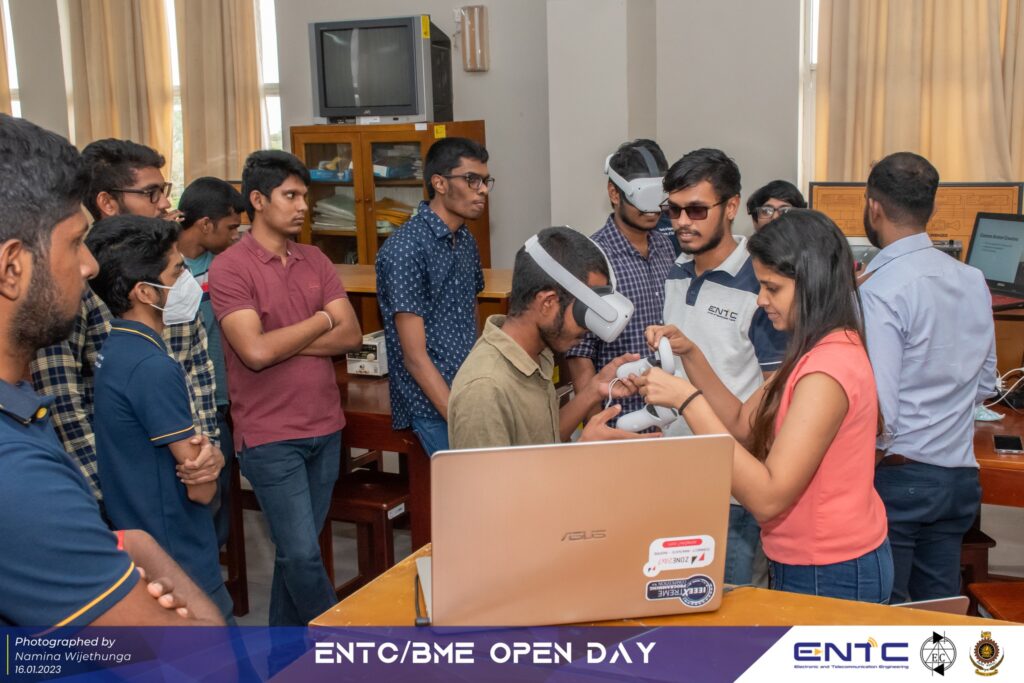
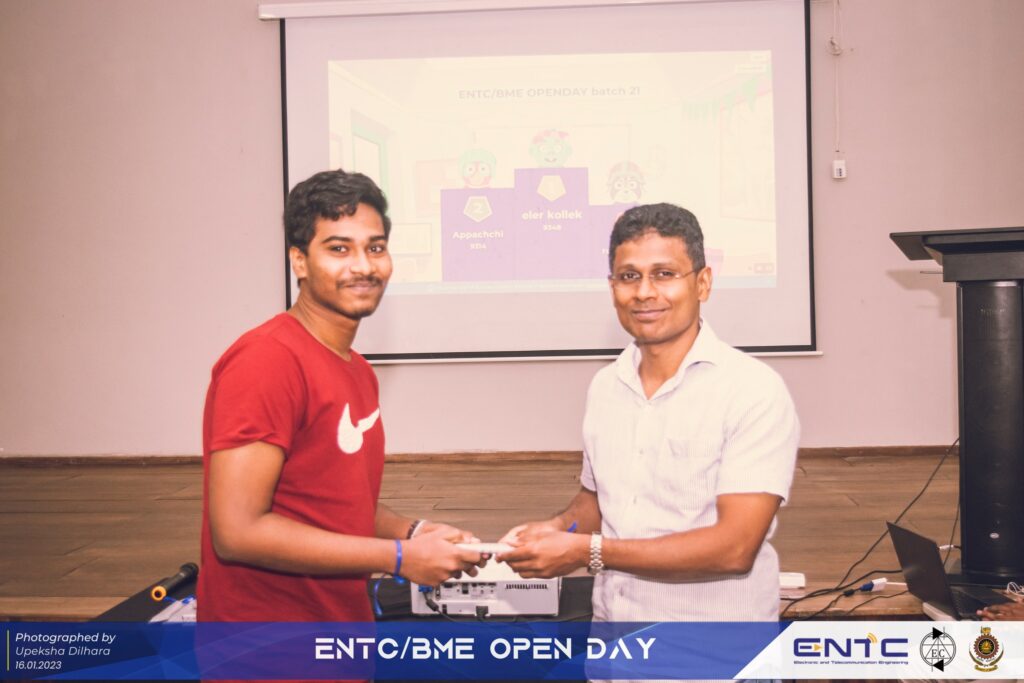
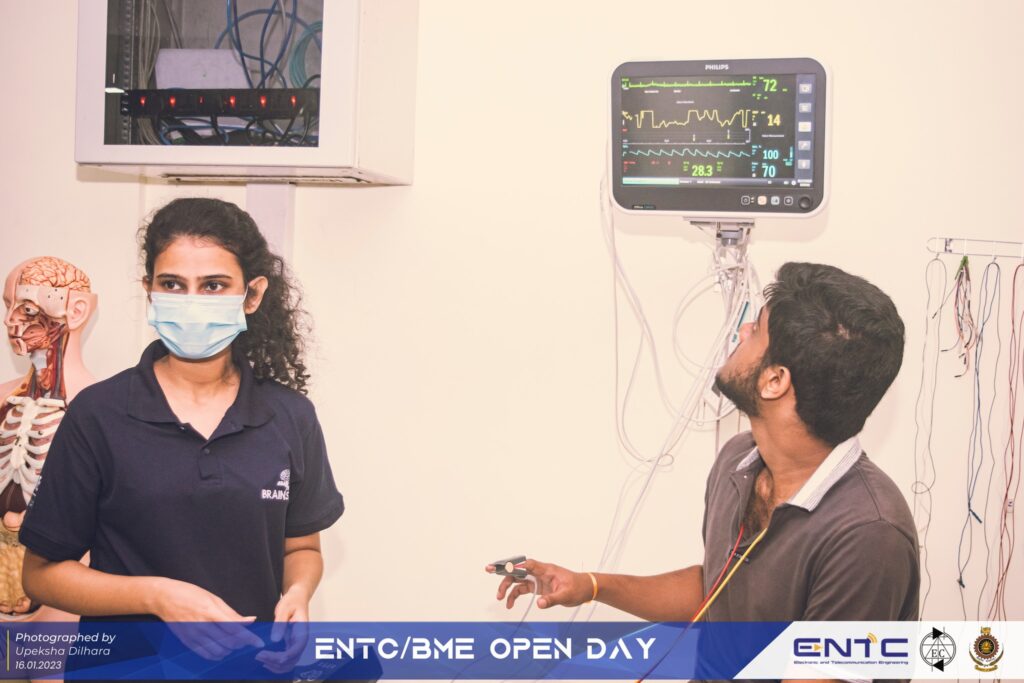
Closing Ceremony of Microcontroller-Based Embedded System Design Course
The Department of Electronic and Telecommunication Engineering at the University of Moratuwa, in collaboration with Skill Surf, recently concluded an 8-week long Microcontroller-Based Embedded System Design Course training program on Sunday, January 29, 2023. The course was designed to equip participants with the necessary knowledge and hands-on skills required to excel in the field of embedded systems design.
Embedded systems design has become increasingly important in today’s world of smart devices and the Internet of Things (IoT). With the rapid advancements in technology, devices such as smartphones, smart homes, and wearable technology have become an integral part of our daily lives. Embedded systems, which are at the heart of these devices, play a crucial role in their functioning. The Microcontroller-Based Embedded System Design Course training program offered a curriculum covering various aspects of embedded systems design. The program comprised more than 30 sessions, which were outcome and project-based, providing participants with a practical understanding of the concepts taught.
Dr. Subodha Charles, who coordinated the course, provided important technical inputs and lectures, along with Abarajithan Gnaneswaran and Kithmin Wickramasinghe. The course was structured to provide a balance between theory and practical implementation, giving participants a hands-on approach to learning. Speaking about the program, Dr. Charles emphasized the importance of embedded systems design in today’s world. “Embedded systems design is a critical field that has become increasingly important with the proliferation of smart devices and the IoT. This program was designed to equip participants with the skills and knowledge required to excel in this field,” he said.
The Microcontroller-Based Embedded System Design Course training program received an overwhelming response from participants, who appreciated the practical approach to learning. Many participants highlighted the relevance of the course in their daily work, noting that they had gained valuable insights into the field of embedded systems design. The program equipped participants with the skills and knowledge required to excel in the field of embedded systems design, highlighting the importance of this critical field in today’s world of smart devices and the Internet of Things.
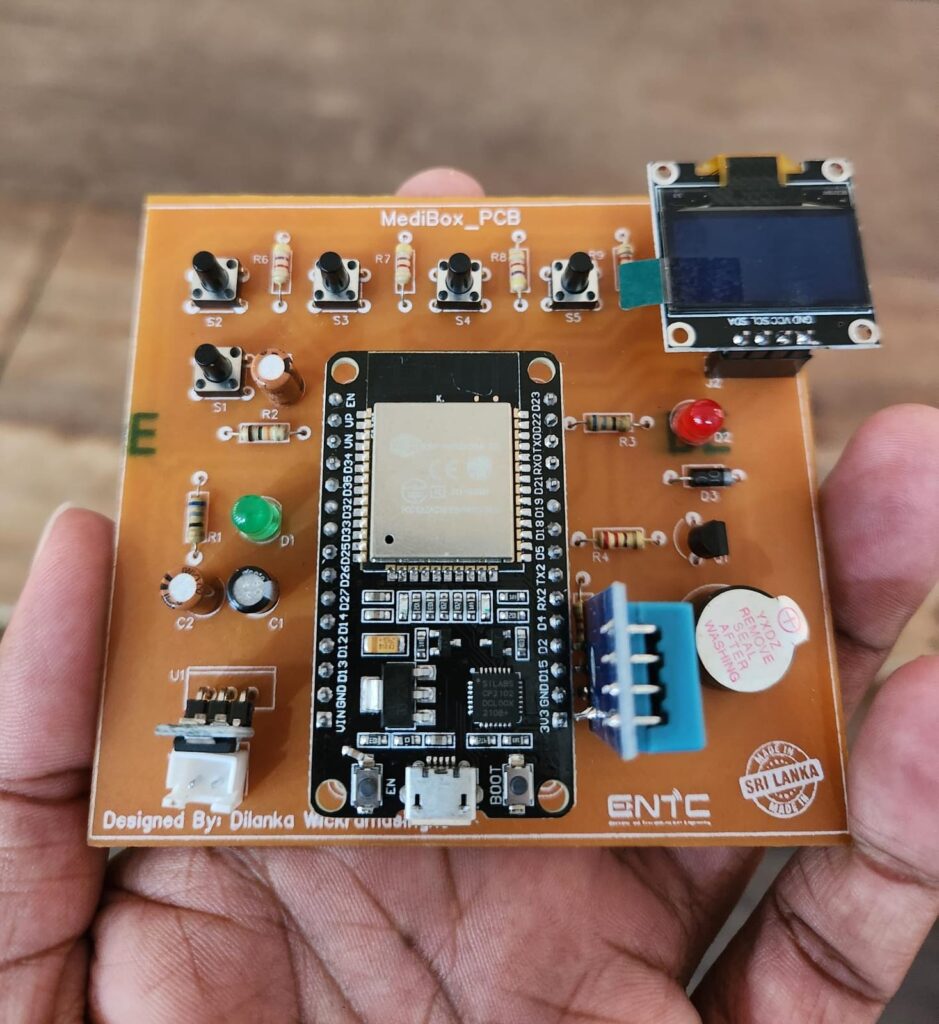
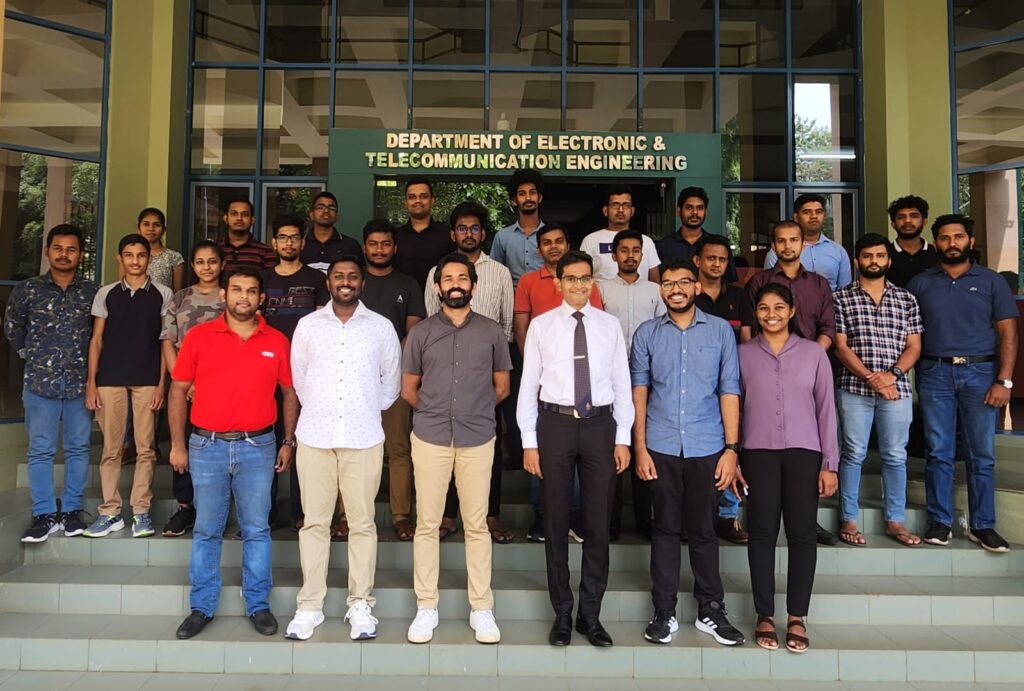
Course on SystemVerilog for ASIC/FPGA Design & Simulation
The Department of Electronic and Telecommunication Engineering at the University of Moratuwa, in collaboration with Synopsys Sri Lanka and Skill Surf, has started an 8-week course on “SystemVerilog for ASIC/FPGA Design & Simulation”. The course is designed to equip participants with the necessary skills and knowledge to contribute to the global innovations chain, particularly in the era of “Smart Everything”.
The course covers digital design with SystemVerilog and emphasizes best practices that match the industry standards. Participants are given hands-on experience on SystemVerilog and Synopsys tools, thanks to our partnership with Synopsys. We are grateful for this partnership and the opportunity it provides for participants to gain practical experience with industry-standard tools.
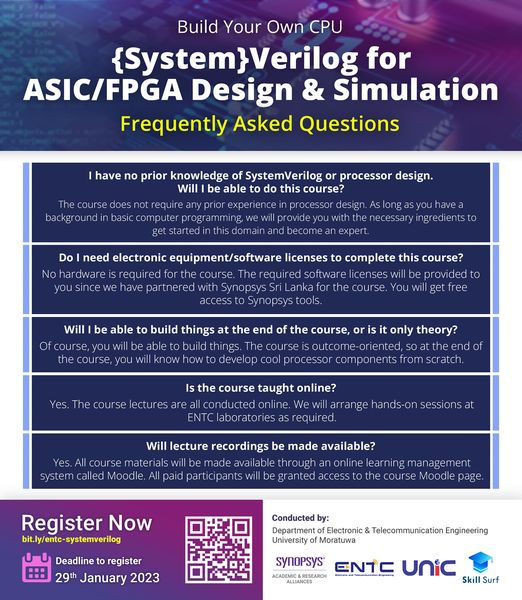
The need for skilled engineers in digital design has grown with the development of the Internet of Things (IoT) and other technological advancements. By participating in this course, individuals can develop their skills and contribute to meeting this growing need. The course is open to beginners and those who aspire to become design and verification engineers.
Registrations for the course closed on 5th February 2023, and the opening session was held on 12th February 2023. The program is progressing well, with a diverse group of participants from universities and industry in Sri Lanka and overseas.
The course provides a valuable opportunity for participants to gain knowledge and skills in digital design with SystemVerilog, and to gain practical experience with Synopsys tools, which are widely used in the industry. We are proud to offer this course and to partner with Synopsys Sri Lanka and Skill Surf to provide a valuable learning experience for participants.
Read MoreWorkshop on Quantum Computing
The Electronic and Telecommunication Engineering Department of the University of Moratuwa, in collaboration with the UBC Quantum Club, IEEE Sri Lanka Section, and Skill Surf, organized a one-day workshop on “Introduction to Quantum Computing” on January 21, 2023. The workshop aimed to introduce participants to the basics of quantum computing, its applications, and its future potential. The workshop featured key resource personnel who are experts in the field of quantum computing. Dr. Harini Hapuarachchi from RMIT University, Australia, Mr. Kithmin Wickremasinghe from the University of British Colombia, Canada, Mr. Ravi Tharaka from Monash University, Australia, and Theshani Nuradha from Cornell University, USA, were the keynote speakers for the workshop.
The one-day workshop attracted a significant number of participants, including students, academics, and industry professionals. The workshop offered a comprehensive introduction to the basics of quantum computing, including quantum mechanics, qubits, quantum gates, quantum circuits, and quantum algorithms. Participants also had the opportunity to learn about quantum computing applications in various fields, including cryptography, machine learning, and optimization. The workshop included interactive sessions, demonstrations, and hands-on exercises to provide a practical understanding of the concepts covered in the lectures. The resource personnel also provided valuable insights into the future of quantum computing and the opportunities it presents.
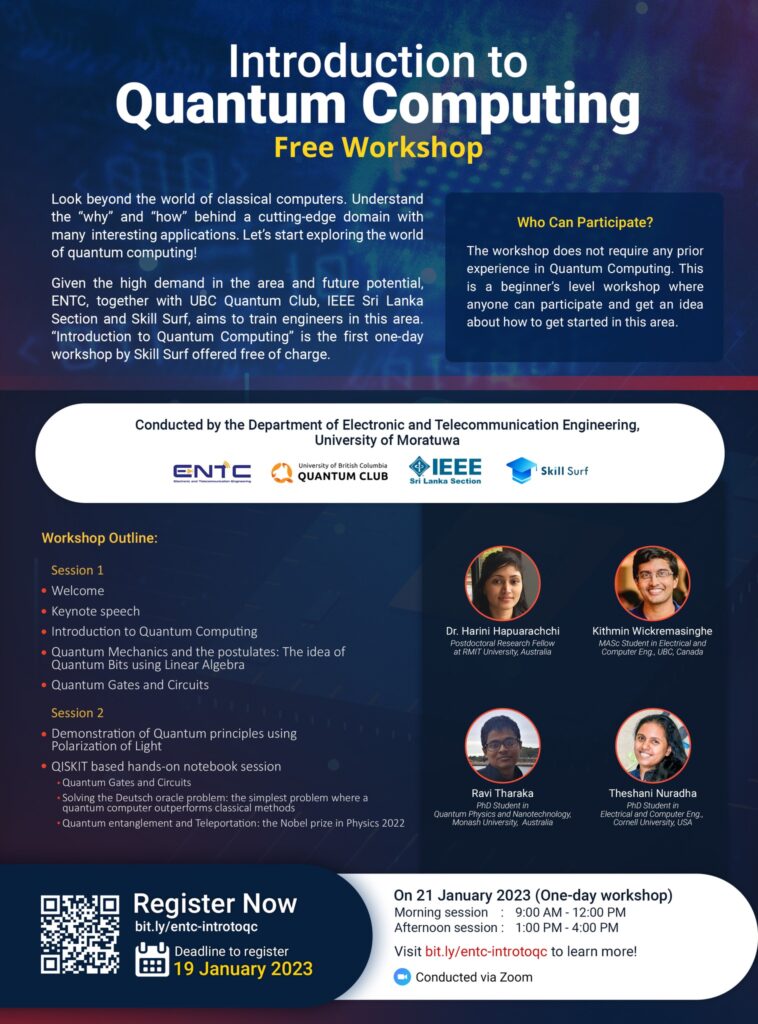
The workshop was a great success, with participants expressing their satisfaction with the content and delivery of the program. The participants also had the opportunity to network and exchange ideas with the experts in the field. The organizers of the workshop thanked the resource personnel, participants, and sponsors for making the event a success. They also encouraged participants to continue to explore the world of quantum computing and stay updated with the latest developments in the field.
Overall, the “Introduction to Quantum Computing” workshop was a great initiative by the Electronic and Telecommunication Engineering Department of the University of Moratuwa, together with its partners. The department has a thrust area in quantum computing. The workshop was an excellent opportunity for participants to expand their knowledge and skills in quantum computing and explore the exciting potential of this emerging field.
Read MoreThe Sri Lanka Robotics Challenge Final School Workshop and Closing Ceremony
The Sri Lanka Robotics Challenge (SLRC) Final School Workshop was successfully held on Wednesday, December 7th, 2022, at the Department of Electronic and Telecommunication Engineering (ENTC) of the University of Moratuwa. The workshop marked the culmination of a series of training programs organized to equip school students with the necessary skills to design a mobile robot for participation in the Sri Lanka Robotics Challenge.
The SLRC is the premier robot competition in Sri Lanka and has been organized by the ENTC for the 10th consecutive year. This year’s challenge has seen an impressive turnout of school students who have shown a keen interest in the field of robotics. The training program included a series of workshops that provided hands-on experience in designing and building a robot.
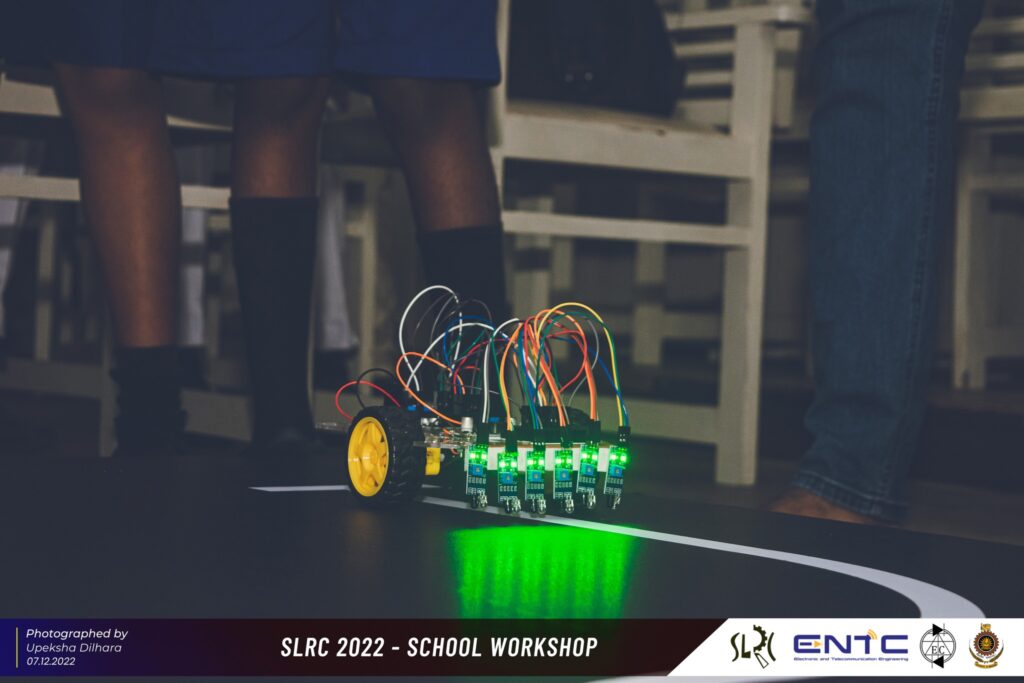
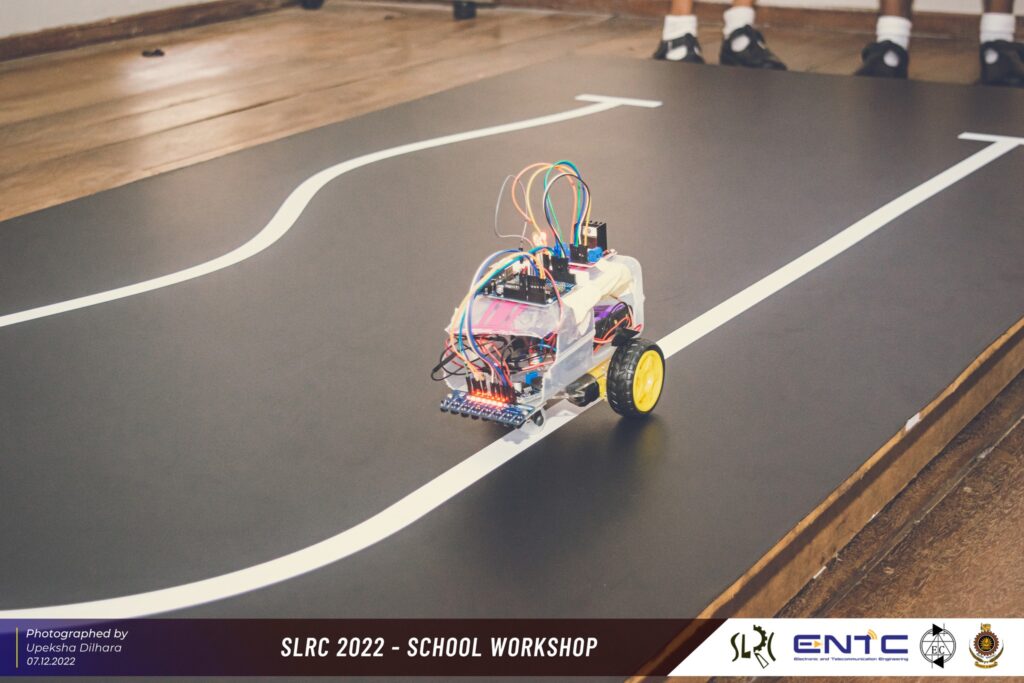
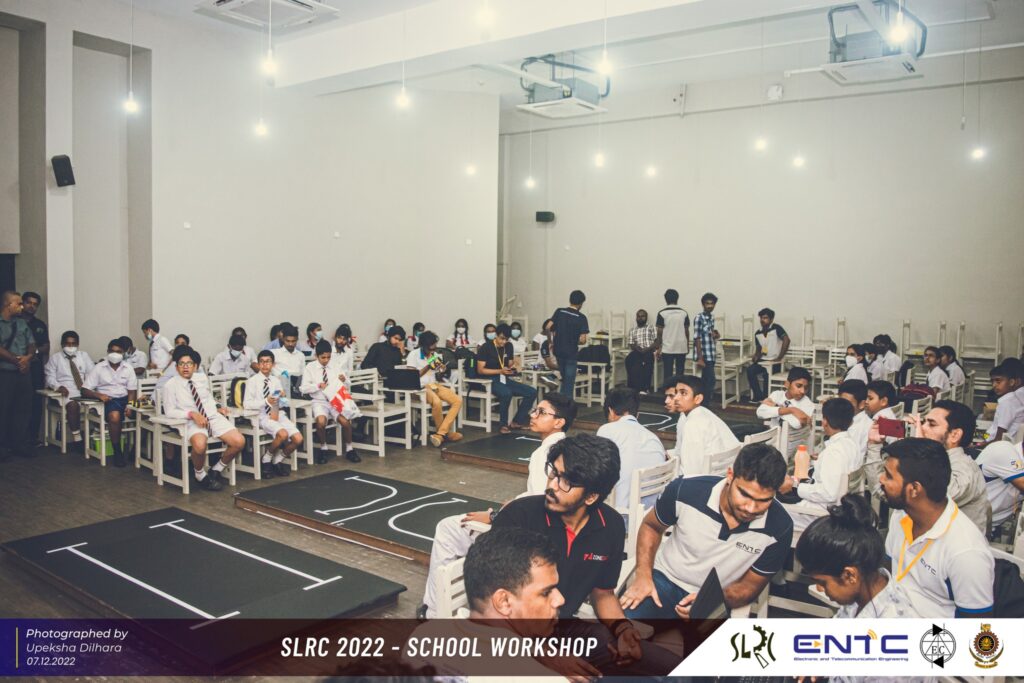
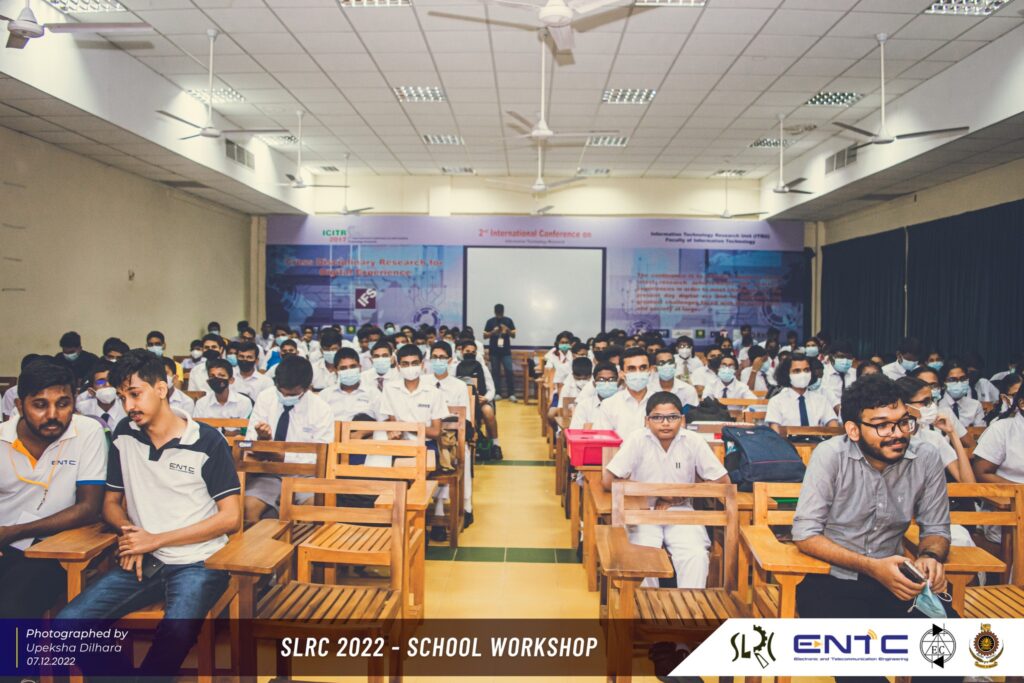
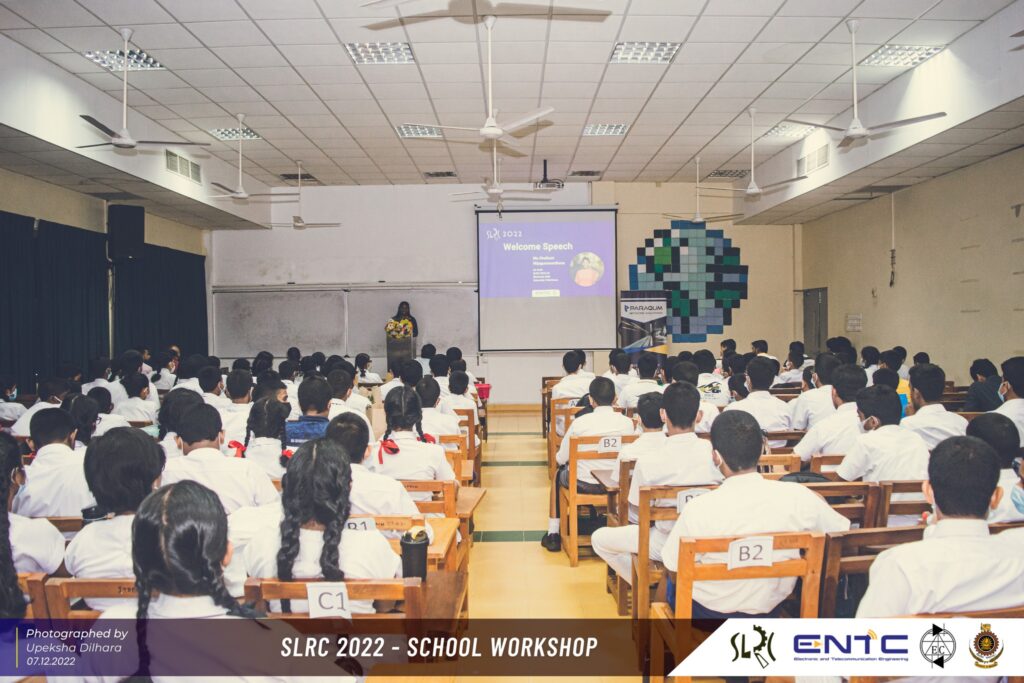
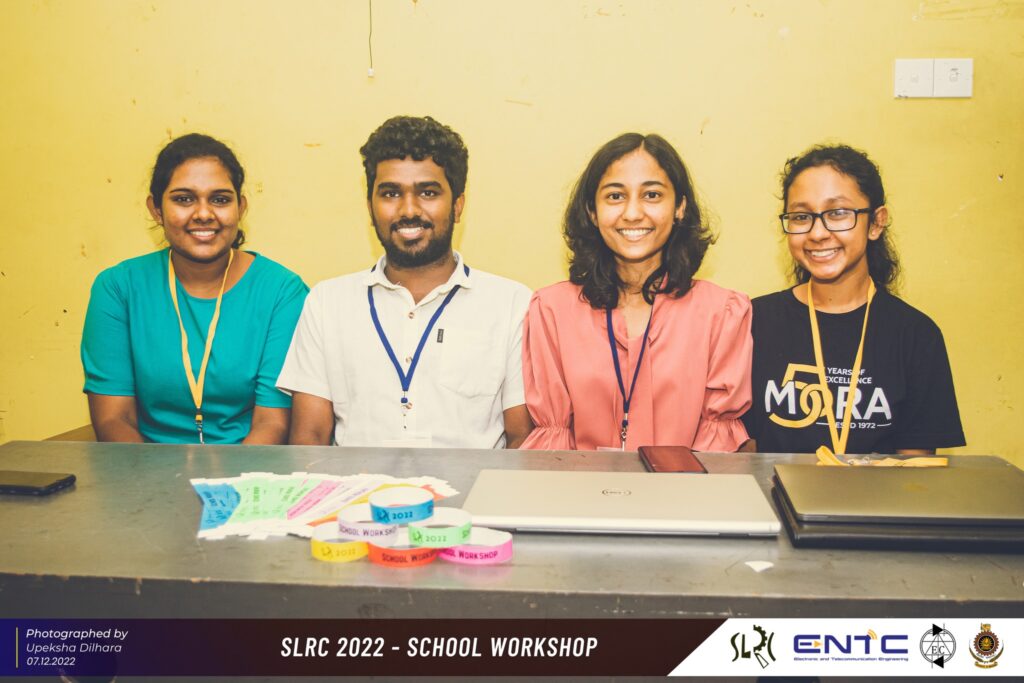
The final workshop was attended by parents, teachers, and students from various schools who had participated in the training program. The attendees were given the opportunity to witness the robots designed by the students in action. The workshop was followed by a closing ceremony attended by faculty members, who awarded certificates to the participants who had successfully completed the workshop.
Dr. Chamira Edussooriya, a faculty member who mentored a team from a school, spoke about the transformative experience that the training program had been for the students. He highlighted the importance of such programs in nurturing the talent of young minds and preparing them for the challenges of the future.
The SLRC Grand Finals are scheduled to take place in March 2023, and the participants are already looking forward to showcasing their skills on the big stage. The competition promises to be a platform for students to showcase their creativity, problem-solving skills, and teamwork abilities.
The SLRC has been a great initiative in promoting robotics education in Sri Lanka, and the University of Moratuwa is proud to continue to organize such events. The success of the SLRC training program is a testament to the growing interest in robotics among school students in Sri Lanka.
Read MoreClosing Ceremony of the Embedded Machine Learning for Edge Computing Training Program
The Embedded Machine Learning for Edge Computing training program, organized by the Department of Electronic and Telecommunication Engineering of the University of Moratuwa in collaboration with Skill Surf, concluded on Saturday, Nov. 20, 2022. The program was designed to equip participants with knowledge and hands-on skills on the topic of embedded machine learning for edge computing, which is an important emerging technology in the field of electronics and artificial intelligence, which is already gaining maturity.
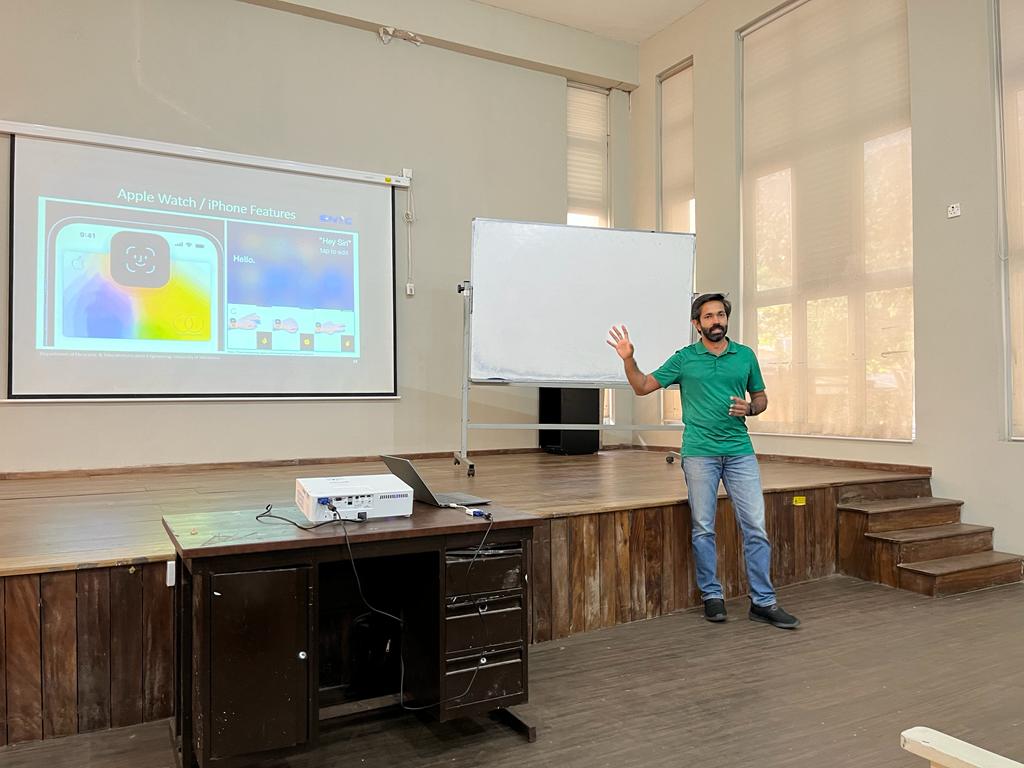
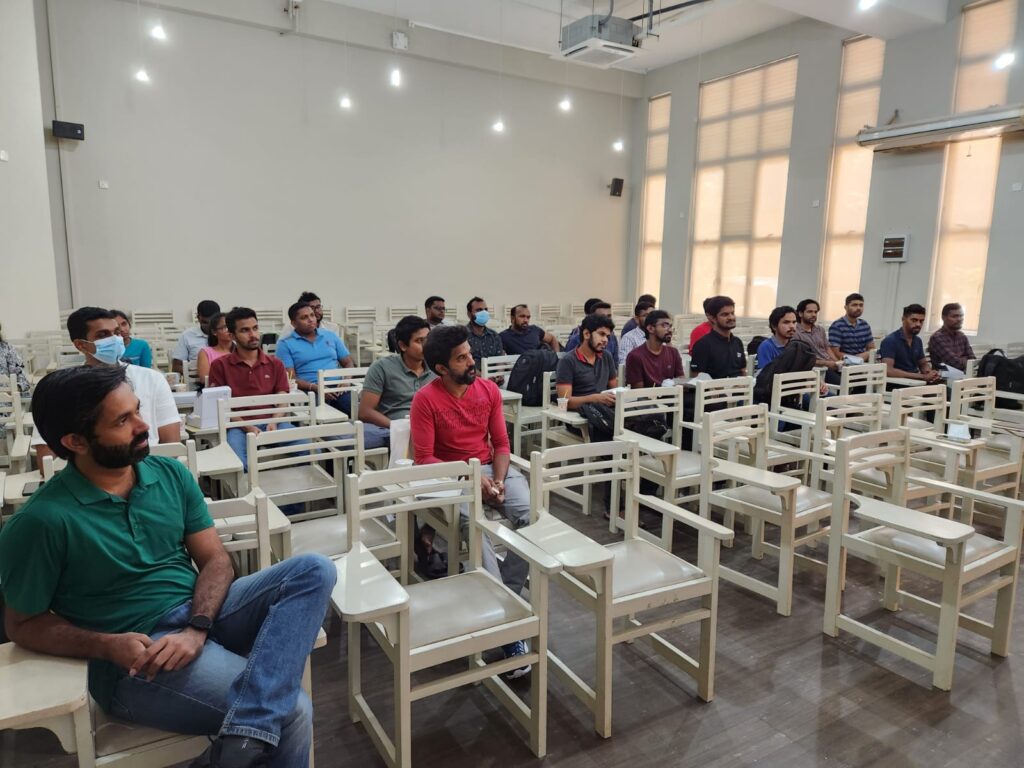
The training program lasted for eight weeks, comprising 16 sessions with project-based learning. The program was attended by a group of enthusiastic participants who were eager to learn and apply their knowledge in practical projects. Under the guidance of Dr. Subodha Charles, the lead course instructor, and other instructors, the participants were introduced to the fundamental concepts of embedded machine learning, including the various algorithms and tools used in the field. Throughout the course, the participants were exposed to various hands-on exercises, which helped them to apply the knowledge they acquired in real-world scenarios. The participants also had the opportunity to work on a final project, which allowed them to demonstrate their understanding of the topic.
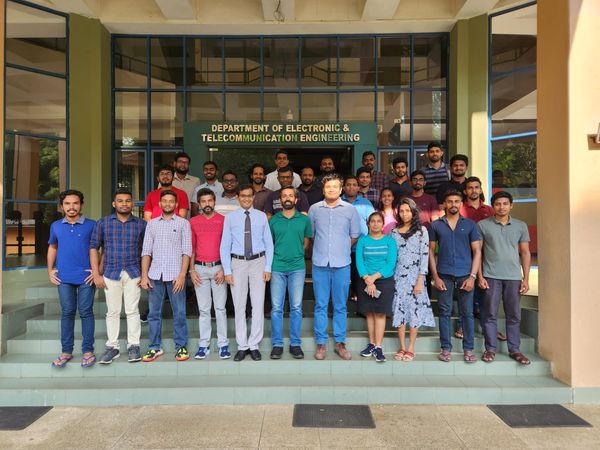
The conclusion ceremony was held on Saturday, Nov. 20, 2021. The event was attended by faculty members and the participants. The attendees congratulated the participants on their successful completion of the program and praised the efforts of the organizers and the instructor in providing a high-quality training program. Speaking at the ceremony, Dr. Subodha Charles expressed his satisfaction with the performance of the participants and thanked them for their commitment and dedication to the program. He also highlighted the importance of such training programs in providing individuals with the necessary skills and knowledge to excel in their careers. The Embedded Machine Learning for Edge Computing training program is one of several short courses offered by the Electronic and Telecom Engineering department of the University of Moratuwa in collaboration with Skill Surf. Stay tuned for more information on upcoming short courses and training programs.
Read More
